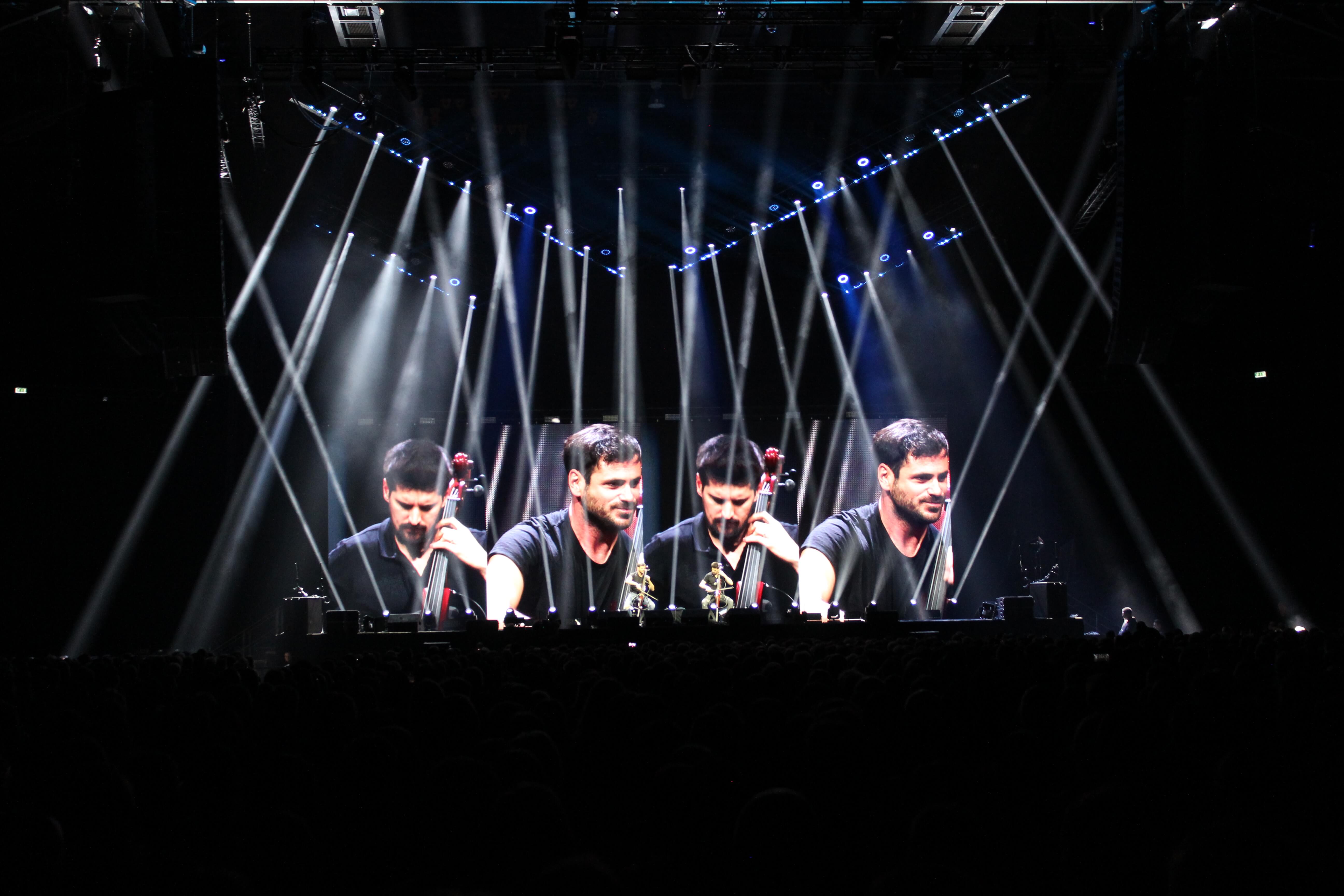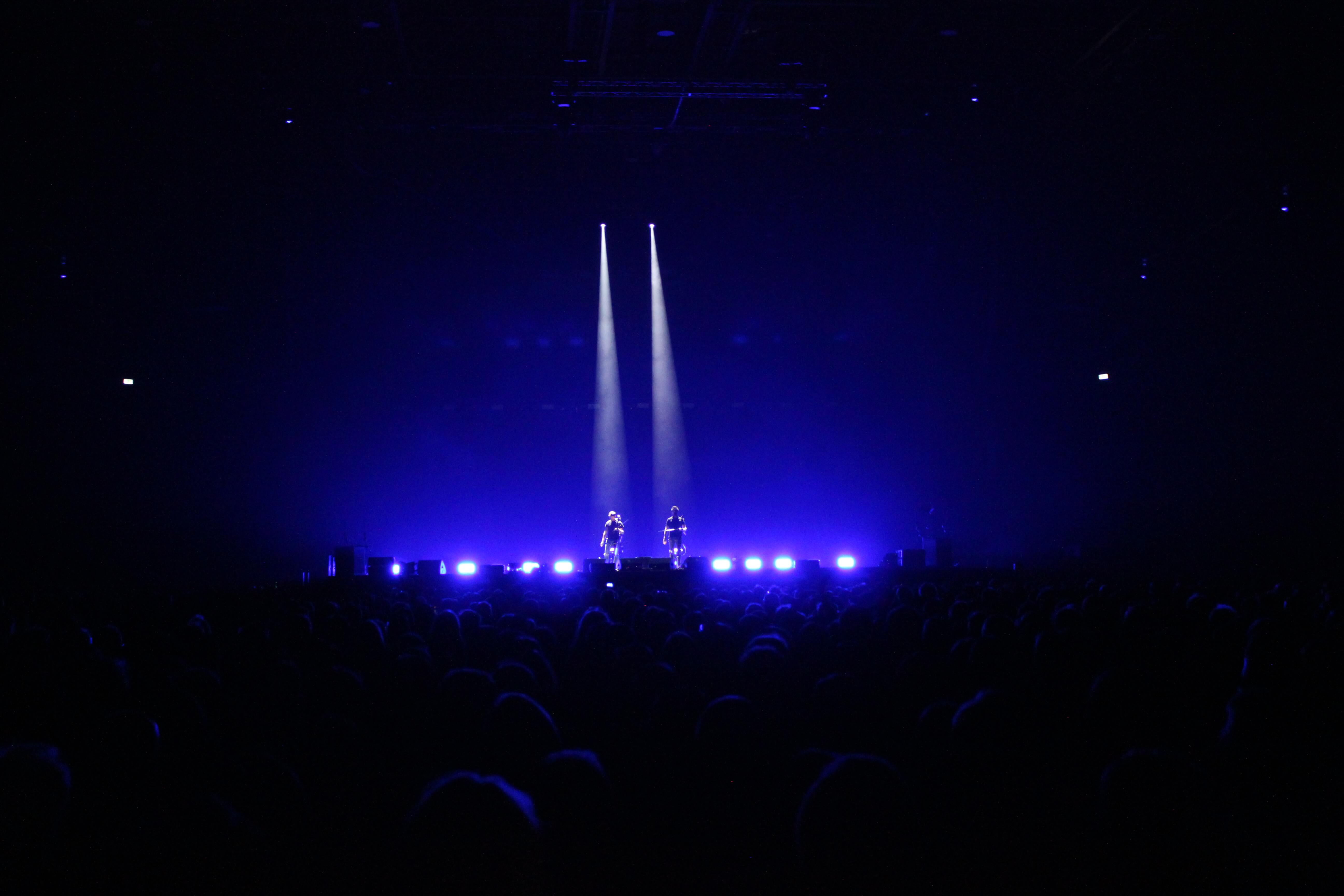Varazdin Pumpkin Oil Wins 4 Gold Medals at 62nd Monde Selection
April the 17th, 2023 - The producers of Varazdin pumpkin oil won four gold medals at the 62nd Monde Selection in Brussels, a prestigious worldwide product quality competition.
Oils from the Agroprom Patrcevic Oil Company, Andreja Petrovic OPG (family farm), Damir Crleni PG and Cafuk PPP received the highest ratings. The great news was announced on Friday, April the 14th, on the Day of Protected Croatian Autochthonous Products in Uljara Agroprom Patrcevic in Strmec. Experts including chefs with Michelin stars and members of the French Culinary Academy praised and complimented Varazdin pumpkin oils.
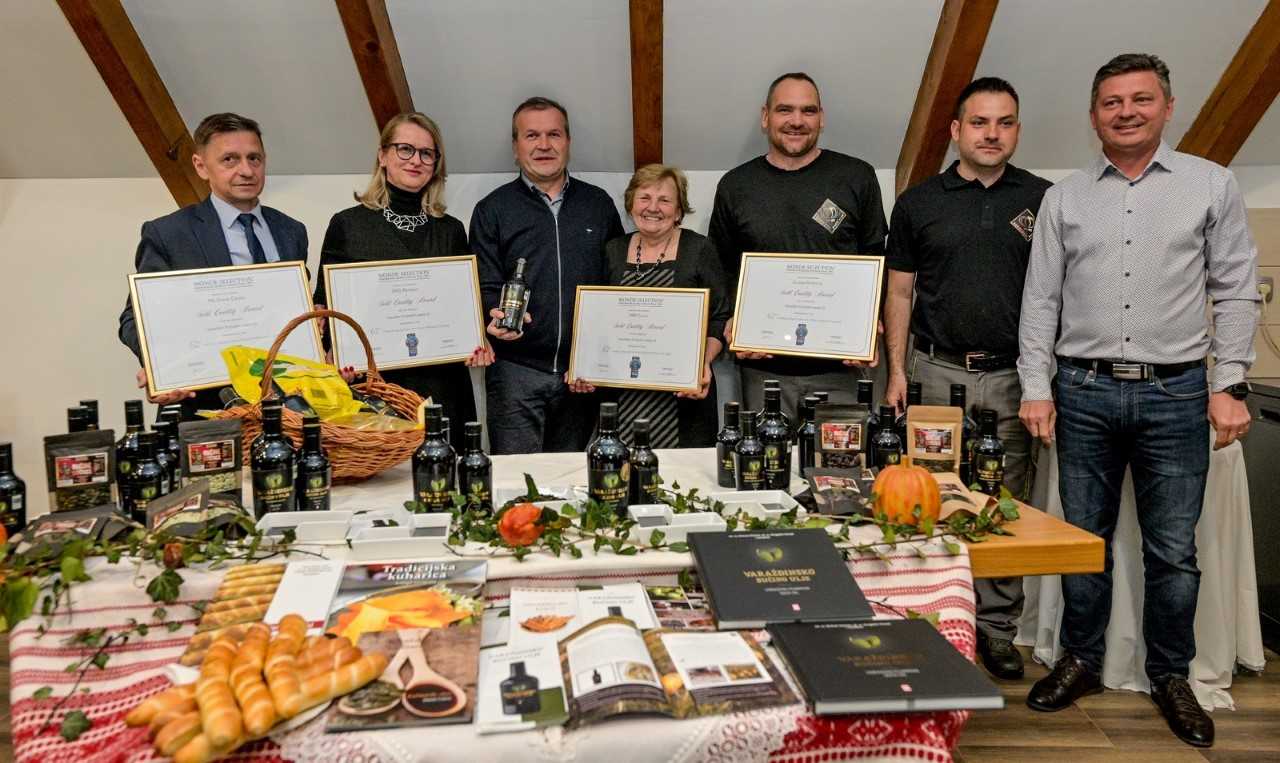
Among more than 3,000 products from around the world, this is certainly a great accomplishment for Varazdin pumpkin oil. Over the past four years, 12 oils from the Varazdin region have been registered, and all 12 have won gold medals. There are as many as 17 protected agricultural and food products in Varazdin County, eight of which are at the European and national level. Varazdin cabbage already has the European quality marks, since 2017, and Varazdin klipic since 2020. It is expected that Varazdin pumpkin oil will also receive formal protection within two months at the European Union level. It means increased value, increased competitiveness, and a higher market price for oil producers.
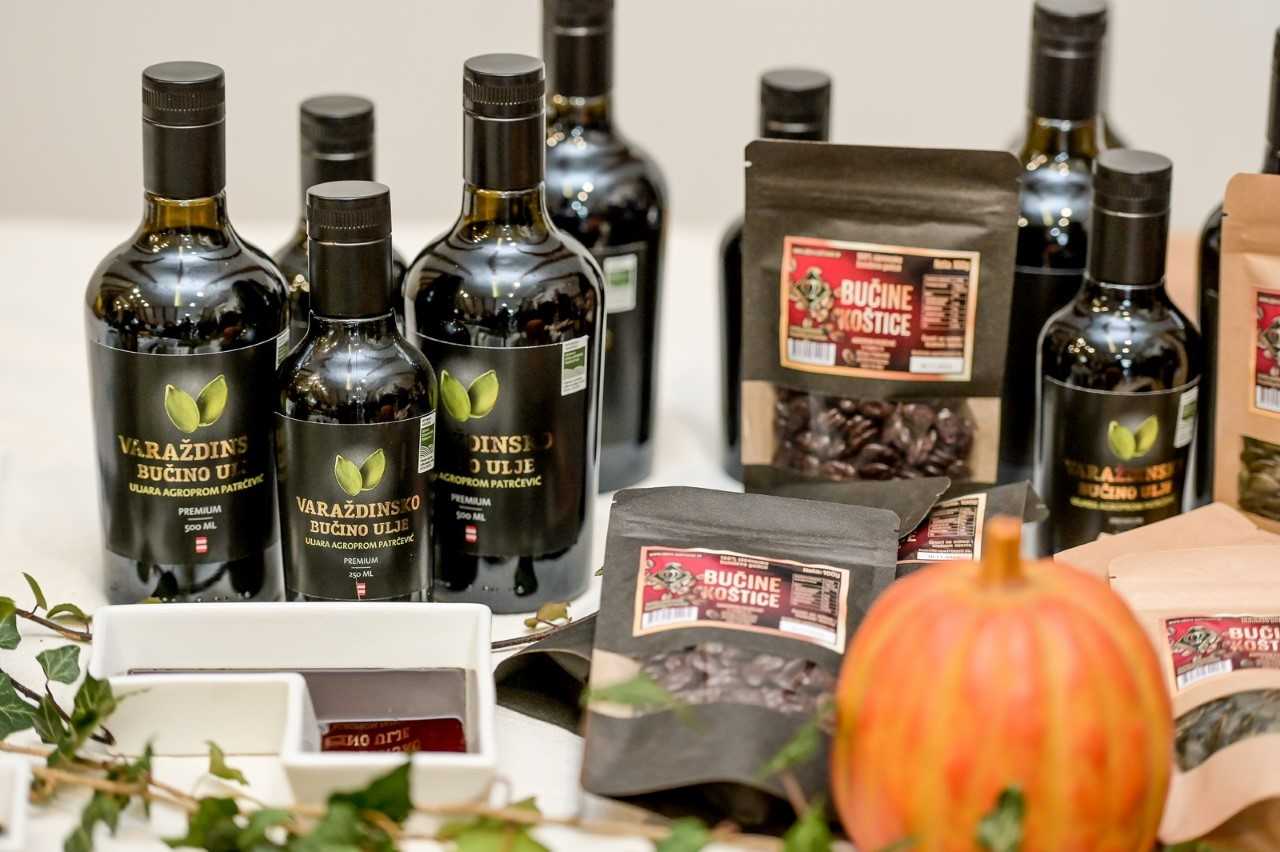
While PPP Cafuk and PG Crleni won gold for the first time in Brussels, Uljara Agroprom Patrcevic and OPG j Petrovic succeeded in doing so for the second time. The Varazdin Pumpkin Oil Association's president and host describes the secrets of the success of Varazdin's "black gold".
''Within the Association, we made a decision that Varazdin pumpkin oil be produced using what's known as the hot-pressed process. It's 100 percent pure pumpkin oil, meaning that it doesn't have the addition of any other, foreign oils. Our "secret" ingredient is a complete commitment to the work at hand,'' emphasised Patrcevic. Members of the Association sell all the Varazdin pumpkin oil they produce, and they plan to expand their production, and as such - their sales.
''When people try Varazdin pumpkin oil, they remember its quality and keep buying it. The customers are the ones who keep us going and give us the incentive to continue doing this business and improve quality levels,'' said Andreja Petrovic.
Damir Crleni, the president of the Croatian Chefs Association, was also proud. ''I wanted to give my own product to gastronomy, which I've been dealing with all my life. I'm glad that some restaurants and hotels in the area of Varazdin and Koprivnica-Krizevci County have Varazdin pumpkin oil in their daily offer, and I hope others will follow their example,'' said Crleni.
The work and effort behind everything is evident, according to Marija Cafuk. ''Varazdin pumpkin oil and Varazdin cabbage are an excellent match. Therefore, we'll continue to strive to make our products as high quality as possible, and accordingly recognisable on the increasingly demanding market,'' said Marija Cafuk.
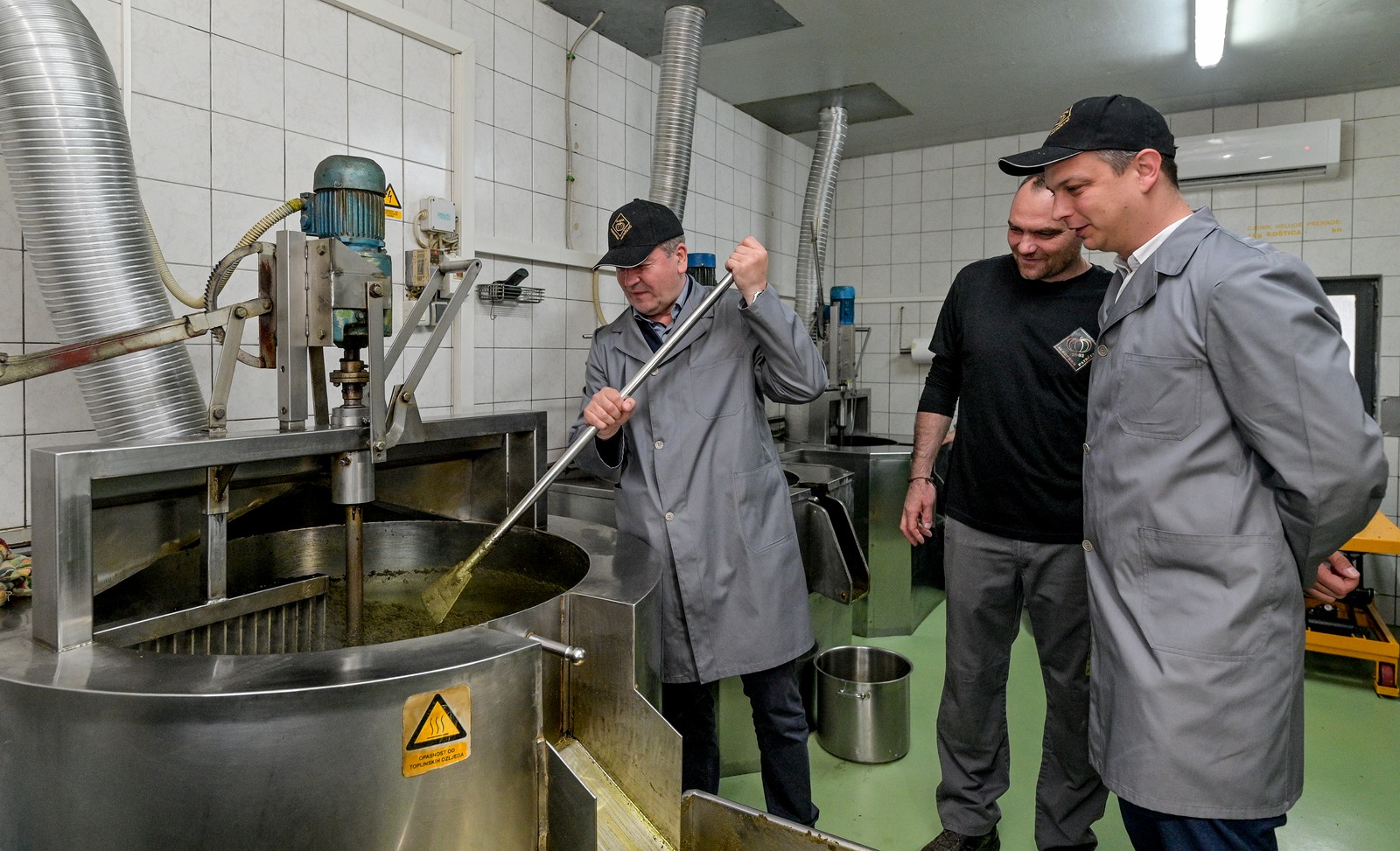
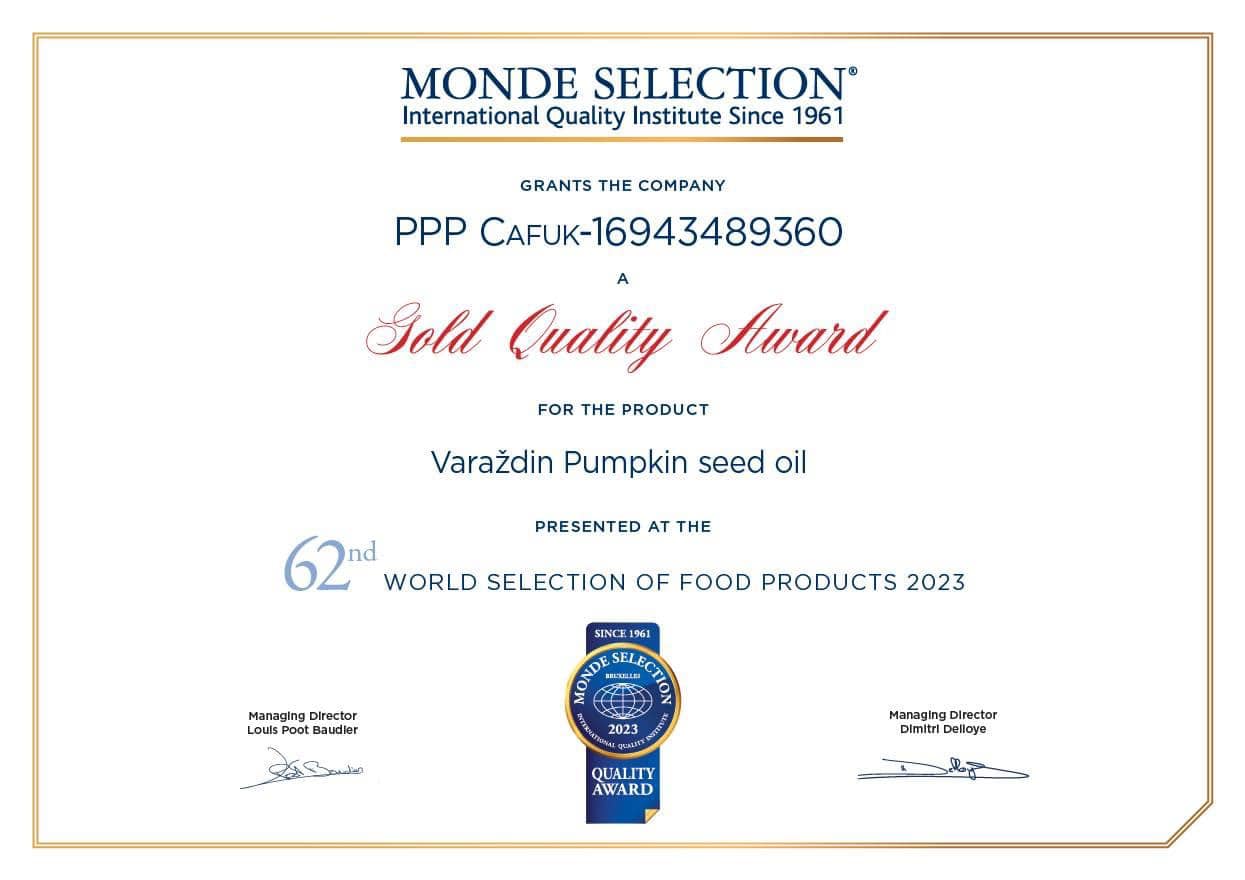
Photos credit: Varazdin County & Vidovec/Facebook
For more, make sure to check out our dedicated Made in Croatia section.
The Long Goodbye Of 2CELLOS: The Duo Who Revolutionised Cello As An Instrument
June 1, 2022 - TCN attended the World Tour of 2Cellos in Brussels where the acclaimed classical-crossover duo, consisting of the extraordinary cellists Luka Šulić and Stjepan Hauser, gave a long goodbye to all their fans for their final tour together.
Despite the general strike in Belgium and the European Summit at the Council of EU, yesterday, 2Cellos performed in Palais 12 at a concert which was totally sold out (all 15,000 seats). The audience consisting of all ages wasn't only delighted by the musical virtuosity which played out during the hour and a half show, but also enjoyed dancing and singing together with the famous Croatian cellists.
The duo was joined on stage, as usual, by Croatian drummer Dusan Kranjc.
2Cellos performing at Palais12 in Brussels (Image: Mira Dujela)
It was a difficult farewell for the audience, but the two musicians had already communicated several times they have both taken different paths. Luka is more of a family man now, with three children and a wife, and Hauser continues to be ambitious, full of ideas and eager to keep going, conquering the world and playing his music everywhere. Having different approaches to life, they thought it was best to take separate paths but will still remain great friends.
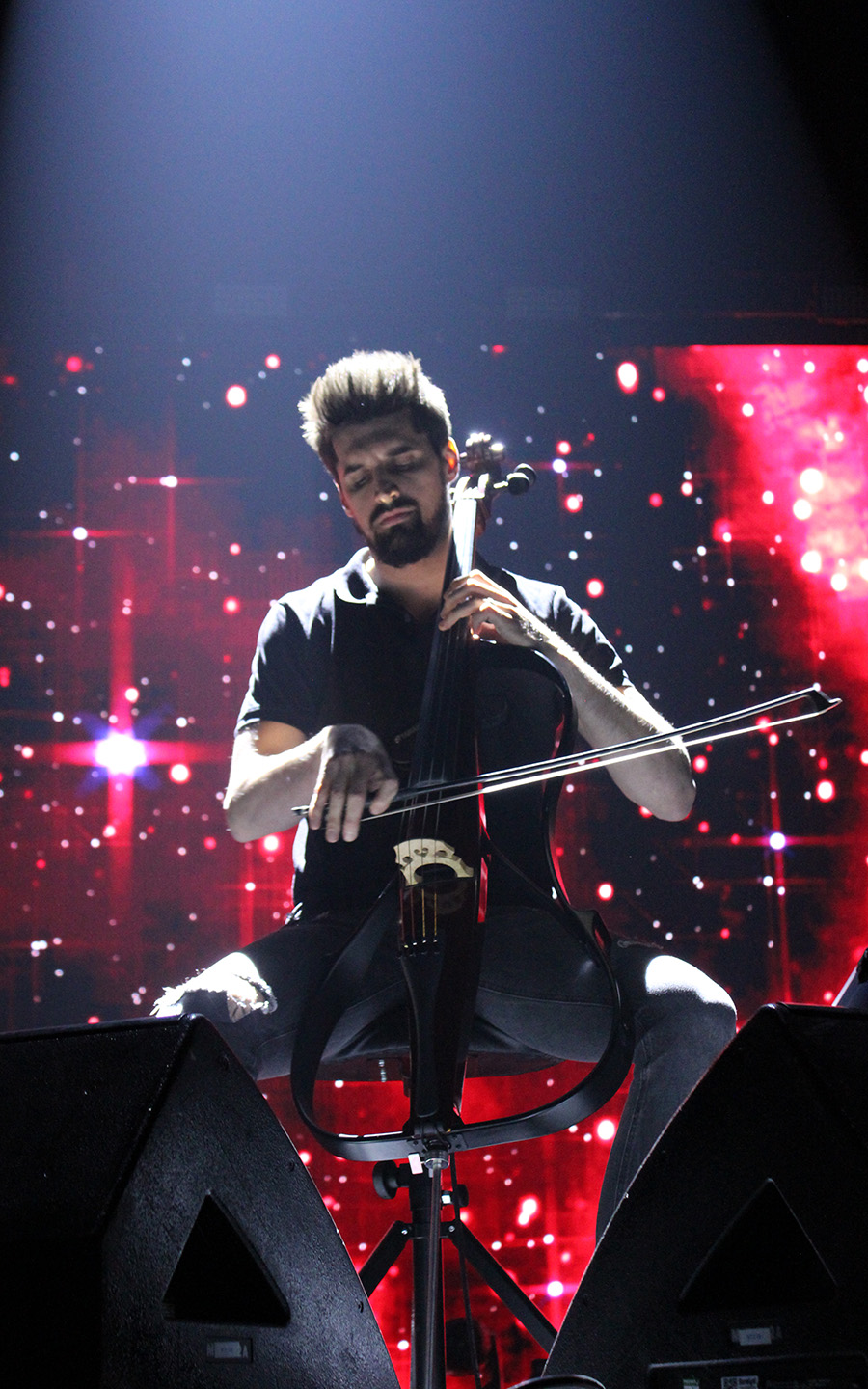
2Cellos performing at Palais12 in Brussels (Image: Mira Dujela
The two Croatian cellists are known for performing famous songs by U2, Leonard Cohen, Guns N’ Roses, Michael Jackson and Nirvana, and are now touring to promote their sixth full-length studio album called “Dedicated.” They have also recently released an extended edition of “Dedicated” that features three brand new bonus tracks — covers of Ed Sheeran’s “Castle on the Hill,” the Beatles’ “Yesterday”, and Linkin Park’s “Castle of Glass”. They won three Porin awards (Croatia’s version of the Grammys) and received the prestigious Order of Danica Hrvatska in their homeland with this last album.
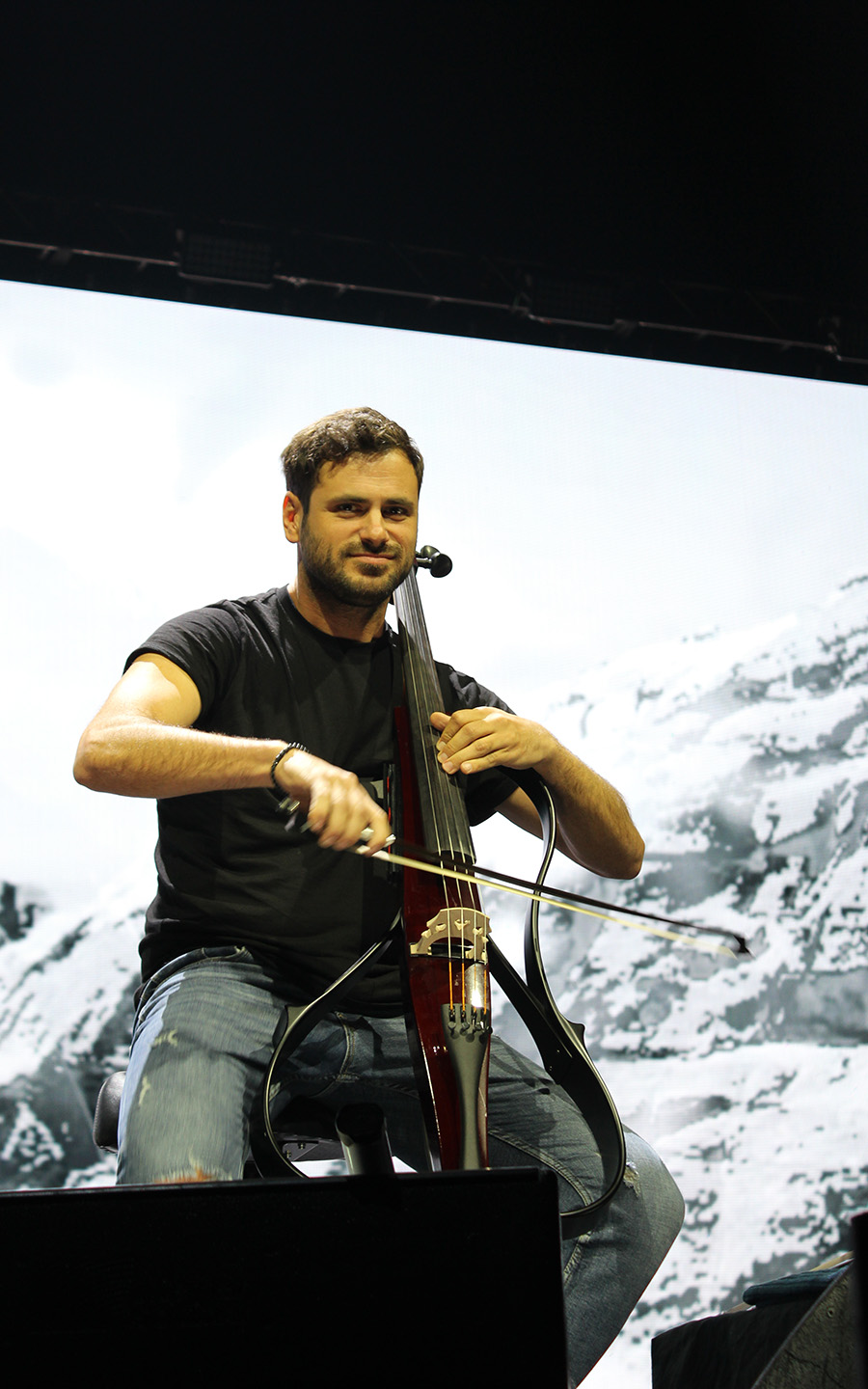
2Cellos performing at Palais12 in Brussels (Image: Mira Dujela)
When Stjepan Hauser and Luka Šulić began studying the cello during their youth in Croatia, they had no idea they’d be recording rock ‘n’ roll classics, playing to sold-out arenas and collaborating with music giants like Elton John and other pop icons.
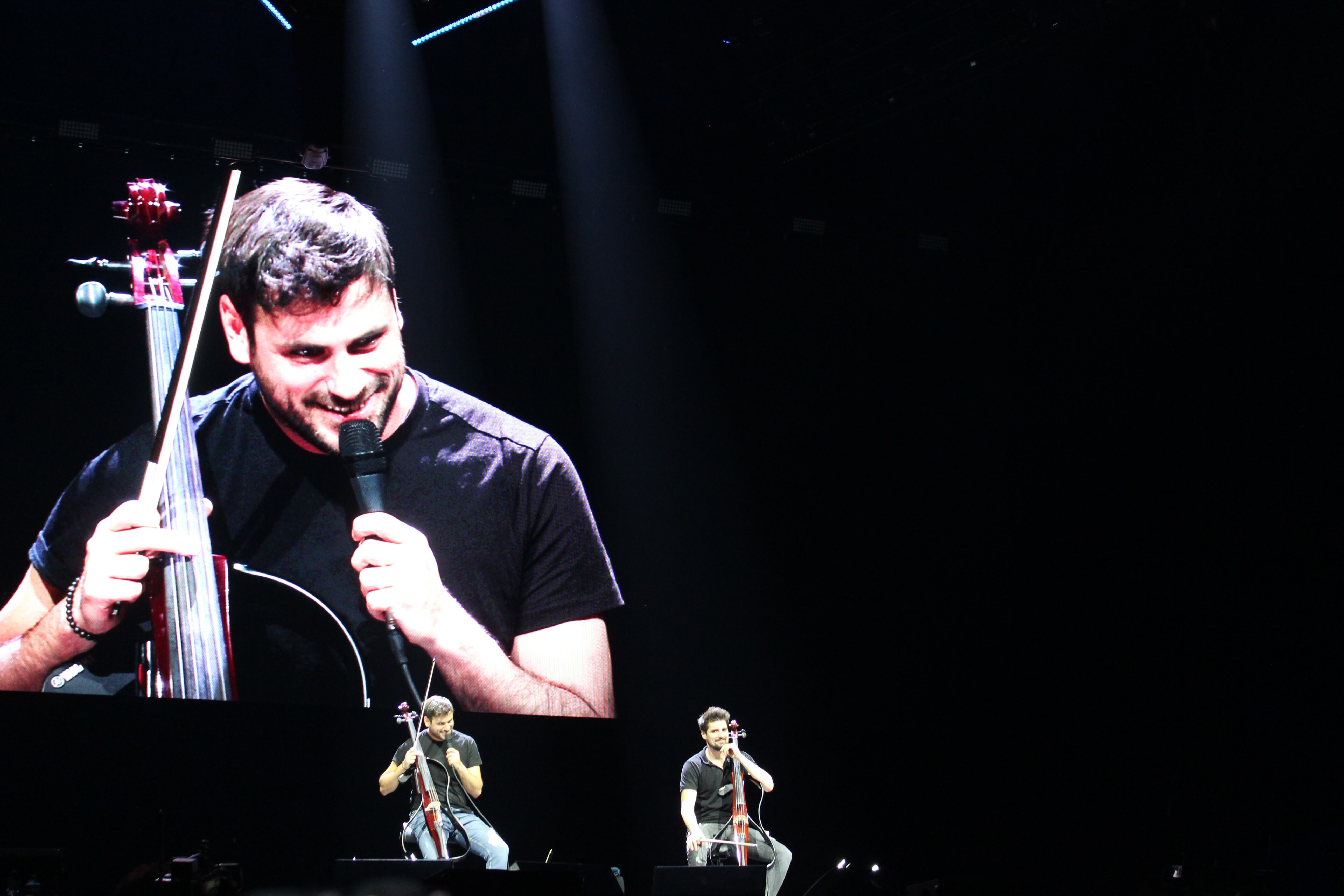
They met as teenagers, as both studied at the Academy of Music in Zagreb, then again later at different schools in England. Though the cello wasn’t a favoured instrument even in the classical world, they both liked it and felt the drive to play well and bring the cello the respect they thought it deserved, not just limiting it to one kind of music. Using Hauser’s words: “We wanted to make it [the cello] feel younger, and we wanted to feel like rock stars, ’cause we were young and rebellious, and we wanted to feel this freedom and do whatever we wanted to do.”
Both have worked independently during the past 12 years, and as they part ways, Hauser, in particular, is ready to go all in with his own solo career.
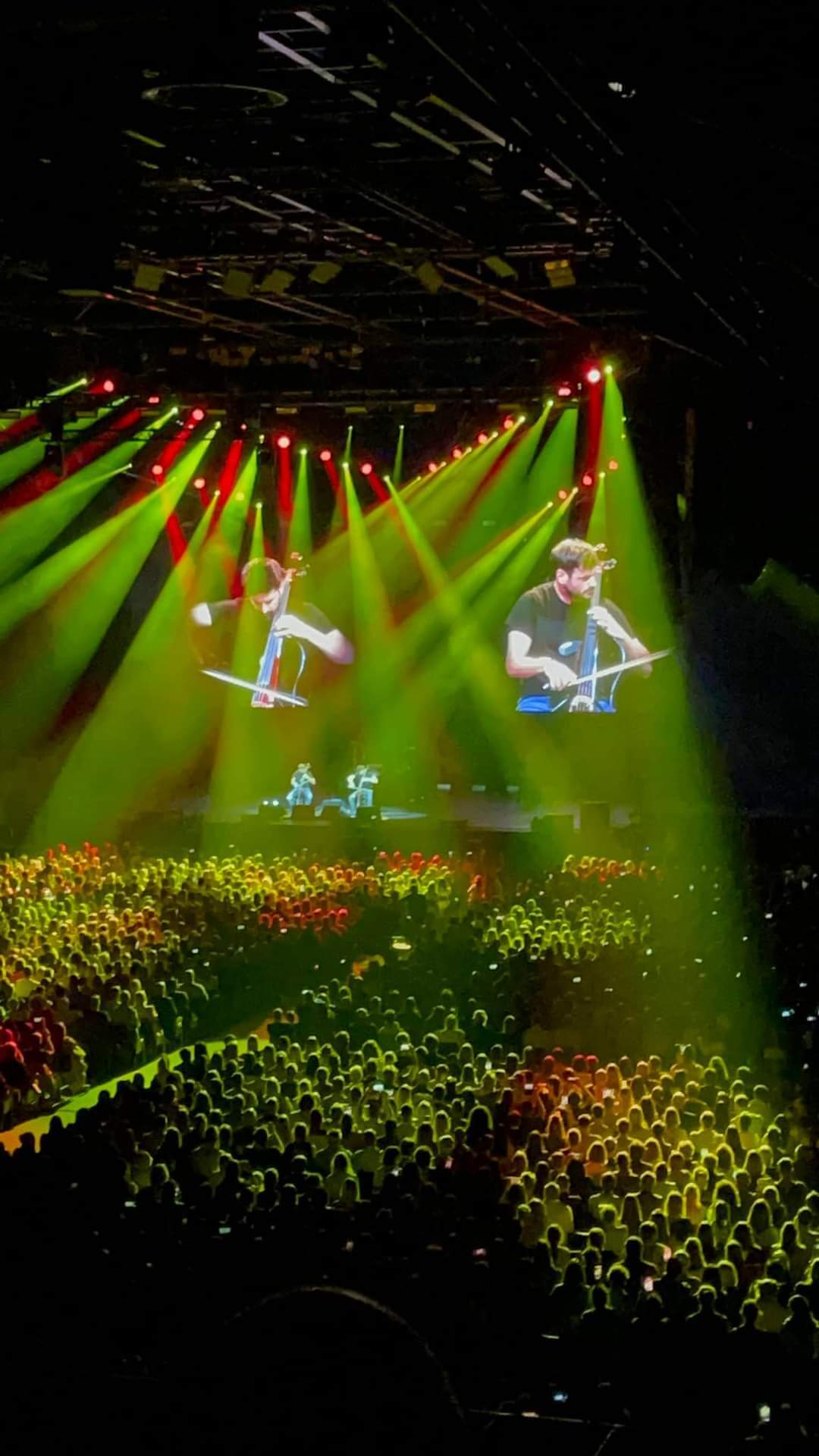 2Cellos performing at Palais12 in Brussels (Image: Mira Dujela)
2Cellos performing at Palais12 in Brussels (Image: Mira Dujela)
More dates will follow in the UK, Spain, Croatia (in Zagreb on 19 September), Italy, Japan, Australia and the last will be held in New Zealand on 4 December. Check the remaining dates on their website.
2Cellos performing at Palais12 in Brussels (Image: Mira Dujela)
We don’t want to reveal the concert's finale, which for Croats living abroad is exceptionally touching! So, give yourself this gift and go and listen to this magnificent duo.
For more, check out our lifestyle section
EU Leaders Task EC to Propose Solution for Addressing Electricity Price Hikes
ZAGREB, 26 March 2022 - The heads of state or government of the European Union's member states, who on Friday concluded their two-day summit meeting in Brussels, tasked the European Commission to propose an efficient solution to electricity price hikes.
The European Council calls on the European Commission "to submit proposals that effectively address the problem of excessive electricity prices while preserving the integrity of the Single Market, maintaining incentives for the green transition, preserving the security of supply and avoiding disproportionate budgetary costs," according to the Council's conclusions.
The Council of the EU and the European Commission are called upon "to reach out to the energy stakeholders, and to discuss, if and how, the short-term options as presented by the Commission (direct support to consumers through vouchers, tax rebates or through an "aggregator model/single buyer", State aid, taxation (excises and VAT), price caps, regulatory measures such as contracts for differences) would contribute to reducing the gas price and addressing its contagion effect on electricity markets, taking into account national circumstances."
After the discussion on the excessive energy prices, which took several hours, Croatian Prime Minister Andrej Plenković said that it was difficult to find a single solution which would suit all the member-states, having in mind that some of them are highly dependent on Russian Russian gas, oil and coal imports.
The EU has three goals: to ensure new supply routes for gas, complete and improve the gas and electricity interconnections throughout the Union, and provide direct support to consumers, he added.
From Brazil To Croatia: Connecting Music and Language through Brussels-Based Guitarist Victor Da Costa
March 7, 2022 - The story of Victor da Costa, an accomplished Brazilian jazz guitarist, cannot leave you indifferent: a story made of passion, music, and great international relations that in 2016 led him to learn Croatian, fascinated by the musicality of our language.
Victor Da Costa was born in Rio de Janeiro in 1971 and started playing the guitar at the age of 11. After studying music at the 'Musiarte' institute in Rio, he moved to Europe to improve his skills, and in 1993 he entered the Royal Conservatory of Brussels, where he obtained the first prize for guitar in 1995 and harmony in 1999. Since 2002, Victor has performed with his trio and different other groups in renowned venues and festivals. He is also active as a composer and has released 3 CDs. Victor currently teaches jazz guitar at the Royal Conservatory of Brussels.
We met Victor during a concert of the duo BraziuFlor in Maison d'Istrie, an esteemed Istrian restaurant in Brussels. After months of closure and restrictions due to the pandemic, we enjoyed an evening of traditional Brazilian Bossanova music and an atmosphere of friendship and joy among the guests. We saw Victor totally at ease in a Croatian context; he talks and jokes with Katarina Ramljak, his partner in the musical duo (and also in life). When we approached him, for a moment, we forgot that he was from Rio. He seemed more like a second or third-generation Croat, born in Brazil to a family who emigrated there several years ago. But we were wrong.
Between one song and another, Victor told us that he had the opportunity to hear the Croatian language for the first time during his studies in Brussels, and immediately fell in love with it. He already knows Portuguese, English, French, and Dutch. He didn’t want to miss the opportunity to study this exotic and distant language, with all the difficulties of starting to learn from scratch, all by himself and without knowing any Croats. He began to look for Croatian people in Brussels interested in a Croatian/Portuguese conversation exchange and thus managed to start practising it. With a Brazilian friend from London, they decided to visit Istria and eventually fell in love with Pula and Rijeka, to which he is particularly attached precisely because this was his Croatian "baptism".
Over the years, he insisted on learning Croatian, overcoming the difficulty of declinations, even if he still fights with suffixes and prefixes. Some help came from the music of Oliver Dragojevic and Arsen Dedic, which he is very fond of.
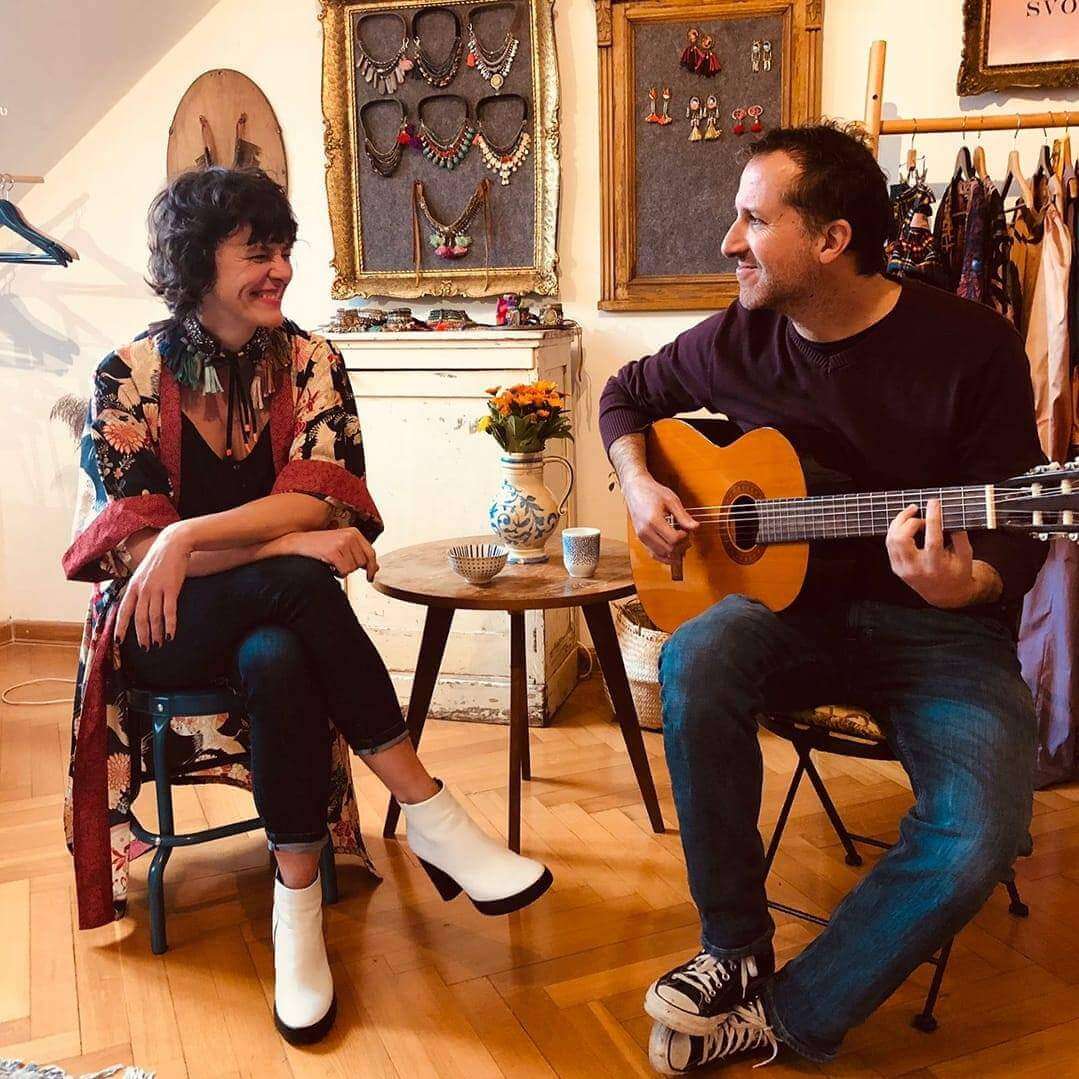
Image: @FacebookPage BraziuFlor
Last summer, he met the singer Katarina Ramljak, who throughout her life followed the same dream, but the other way round: learning Portuguese and singing Brazilian popular music. Katarina studied Portuguese literature and has been to Brazil five times to take singing courses. For years she has been looking for a guitarist for her music project BraziuFlor. When Victor arrived, everything was straightforward, as if it was always meant to be.
Over a glass of good Istrian malvazija, we asked Victor what he likes about Croatia and what he does not give up when he goes to visit Katarina in Zagreb. Victor replied that he loves the sociability of having coffee in Croatia, which is not just the gesture of drinking a cup of coffee, but it means talking, welcoming, and socialising: “Sometimes you start drinking with a group of 3 or 4 people, and after 1 hour you end up in 10. In Brazil, the same happens, which makes me feel at home. We are always in a hurry and finding time to dedicate to friends is one of the most beautiful gifts we can do to ourselves," he explained.
He often goes to Croatia, especially now that he has a sentimental reason, but he also has many musician friends and often plays in jazz festivals. He is very impressed by the development of Croatia in terms of infrastructure and tourism, and he finds that the coast is stunning everywhere. However, he would like other areas to be more valued, such as Slavonija and Zagorije, hidden jewels that still not many people know.
Victor will play again at Maison d'Istrie on March 17th. In Croatia, we will listen to BraziuFlor definitely in August when they will hold several concerts during summer festivals.
Talking with Victor and Katarina was extremely pleasant even to grasp their complicity, the mix of Croatian and Brazilian in their speeches and the correctness of Victor’s Croatian grammar makes us understand what a great professional he is: a complete musician with great talent but also with a true heart and good vibes! Viva a Mùsica!
For more, check out our lifestyle section.
Croatian Heartbeat in Brussels: TCN Meets FC Croatia BXL
February 28, 2022 - FC Croatia BXL is the only Croatian football team in the European capital that has already participated in the BXL Euroleague tournament in Brussels for eight years.
Croatian amateur sports clubs are one of the most recognizable symbols of Croatian identity. Today, there are about 200 Croatian football clubs globally, most of which are in countries with sizeable Croatian emigrant communities such as Switzerland, Sweden, Germany, Australia. There is not a big Croatian community in Belgium, but it is undoubtedly one of the most dynamic.
Brussels is a lively city that attracts many young talents, being the centre of European institutions. There are also national delegations and the leading European headquarters of the most important international NGOs. With the entry into the European Union, Croatia has also been able to spread its talents and allow many qualified Croatians to start their professional growth here in Brussels. Being surrounded by a favourable environment makes, of course, the difference; that’s why new job opportunities are not enough to be happy.
To settle in, someone must also feel welcomed, find a place where to pursue one’s own interests and passions. And it is precisely from this idea that in 2014 Leon Leskovec (EU Parliament employee) decided to organise a football team that could bring together and welcome Croatian sportspeople. A place where to breathe some homeland spirit. As a result of this call, a weekly meeting point was gradually established, which helped develop friendships and relationships between the participants.

Photo: Archive FC Croatia BXL
We met Diego Antoncic (who works for an Austrian consulting firm) and Oskar Whyte (EU Commission employee), who play a big part in the club.
Tell us a bit more about how you have organised yourselves?
Since 2014 we have regularly participated in the BXL Euroleague with 17 other international teams. FC Croatia BXL is the first Croatian football team in Brussels to participate in this competition. The team consists of about 32 players, of which 70% are Croats (at least of origin), and the remaining are "foreigners" from Bulgaria, Greece and Arab countries, etc. Therefore, we also have our "foreigners”! The age group is between 25 and 35 years old. We train on a weekly basis, and the official matches are held during the weekend at the Stade Chazal, owned by Schaerbeek, one of the Brussels communes. The Schaerbeek commune and all of their employees have been supporting the club for years and providing the necessary football pitch to compete in the league. We are currently in the middle of the rankings, but we hold on and plan to do great things this year: the spirit keeps us motivated!
You don’t have an official coach, but you have created a technical board and consult before each game. Do you get along?
Besides being a team, we are also friends who meet outside the matches, even after work. Those who move here soon start looking for an activity that makes them feel "at home”. Usually, football among us guys is a significant motivational boost. Mladen Mlinaric has been our coach for a long time, but two years ago he went back to Croatia. Since then, we have gotten along well as a team of coaches. A proof of this is that we also organised our first Team Building last year in Bosnia and this year we will do it in Bulgaria to pay homage to one of the "foreigners" in our team. We believe it is a positive gesture and a sign of good integration.
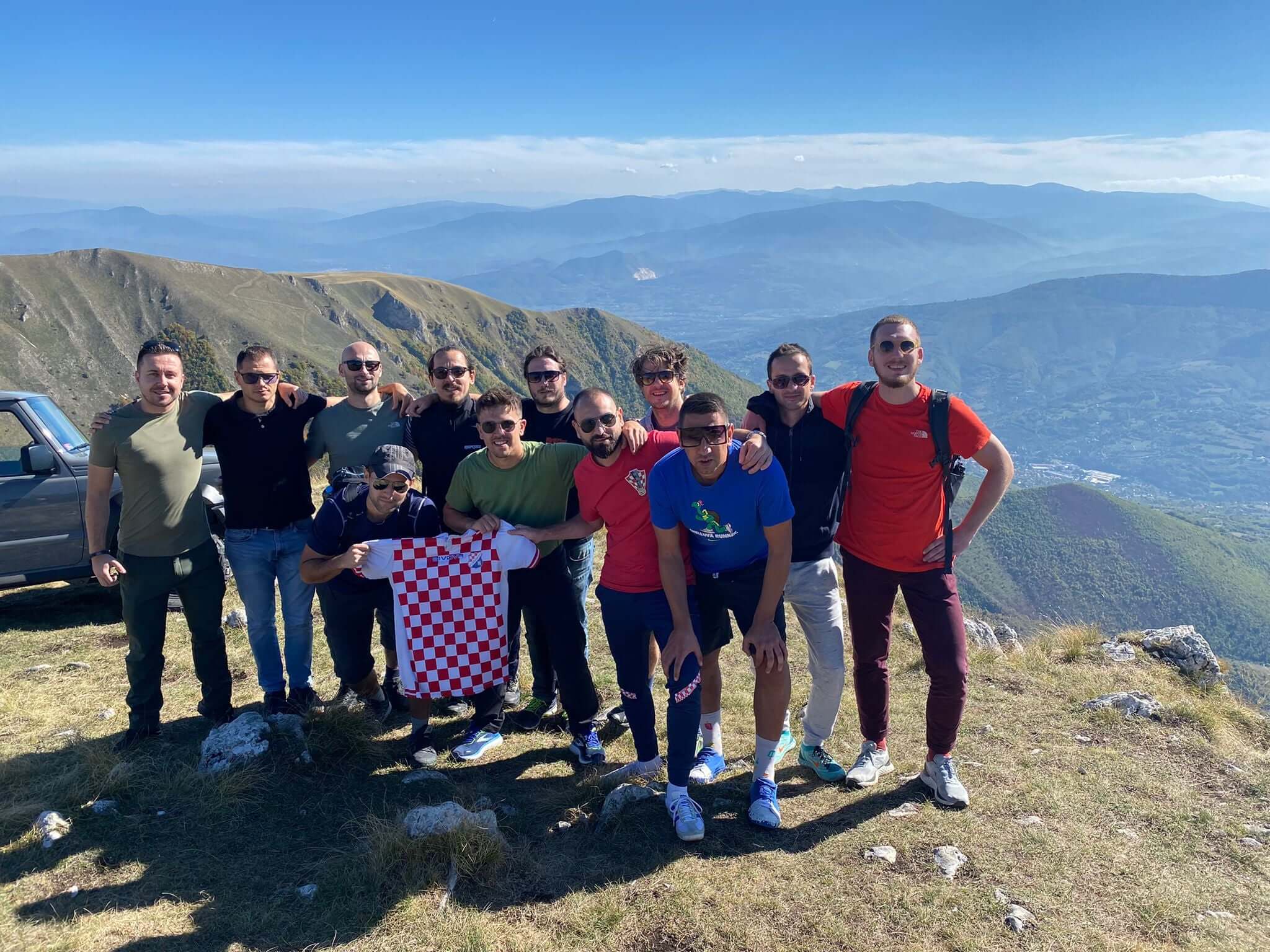
Photo: Archive FC Croatia BXL - First Team Building
And how do you organise when our national team plays?
Since we enjoy and play football ourselves and have a good audience that follows us, we regularly organise watching the matches of our national team at the Stade Chazal. During the Euros and World Cup, the city of Brussels also sets up mega screens in strategic points, such as the Cinquantenaire Park. We usually book a whole side of the lawn under the big screens to enthusiastically support our “Vatreni”, contacting all our followers and spreading the word to be as numerous as possible.
FC Croatia BXL self-finances all expenses (from stadium rental to membership fees). They have only two sponsors: the Mexican restaurant “El Sombrero” in Leuven (the owner is Croatian and their long-time player Adrian) and Access Advisors, a consultancy owned by one of our strikers. The Croatian National Football Federation has twice given them the uniforms to play and as of a few weeks ago, they are expecting a new self-funded delivery. They would also like to play with other "Croatian" teams in Europe or even host teams directly from Croatia. In June, they usually organise a tournament between Croatian teams from neighbouring countries (Holland, Luxembourg, Germany) to celebrate the Croatian national day together. In 2016 they were also candidates for the Večernjakova Domovnica for the sports category.
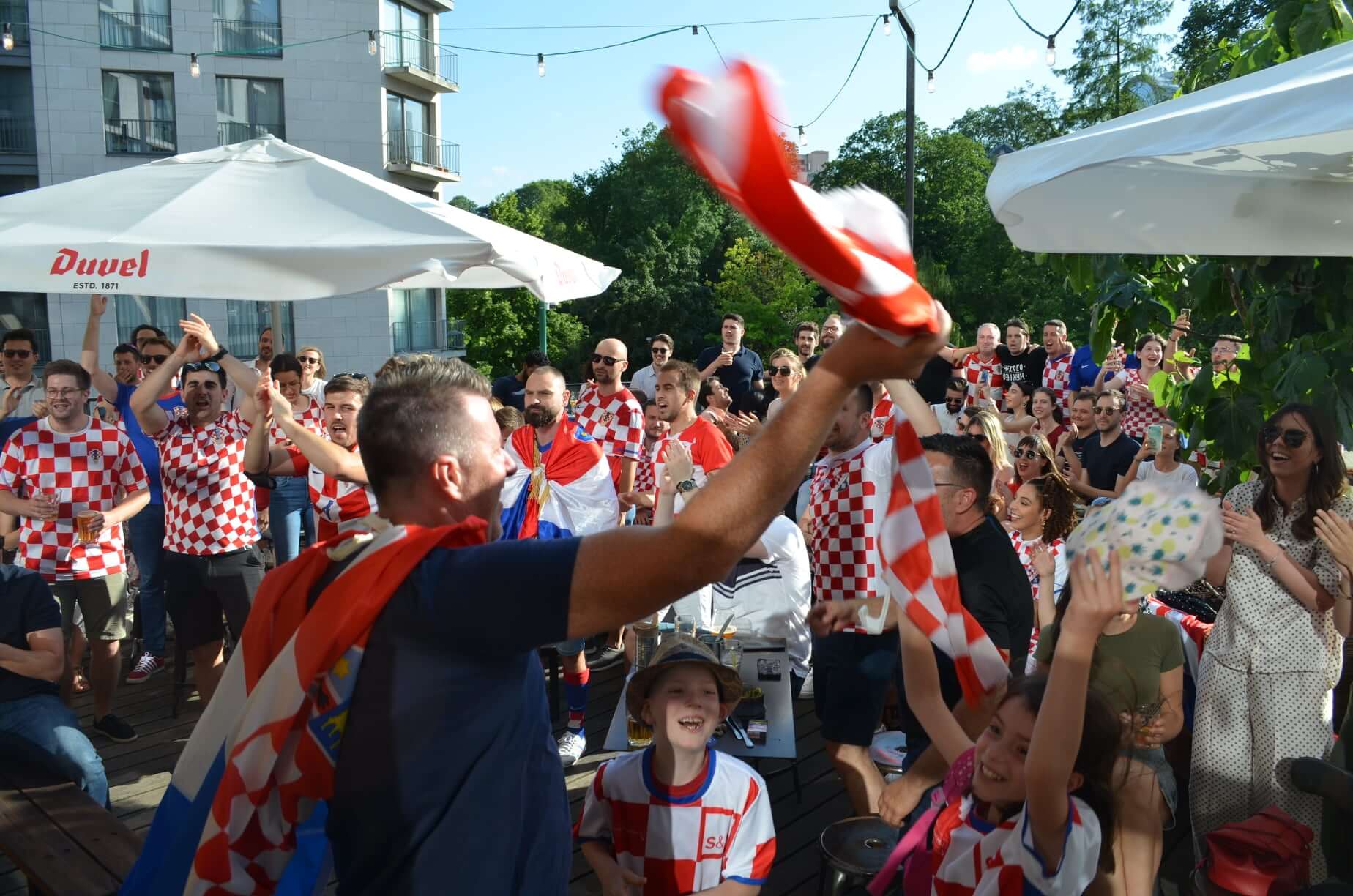
Photo: Archive FC Croatia BXL
We look forward to seeing how they will organise for next autumn with the World Cup in Qatar. Still, given their overwhelming enthusiasm and excellent organisation, I would advise Croats in Brussels to follow their Facebook page not to miss any opportunity to support and cheer on Croatian sport, starting from the local one.
To read more about sport in Croatia, follow TCN’s dedicated page.
Croatian Foreign Minister says Leaders Should Cease Blaming Brussels for Everything
ZAGREB, 20 Feb 2022 - Leaders in Europe should stop blaming Brussels for everything as they also participate in policymaking of the European Union (EU), Croatian Foreign and European Affairs Minister Gordan Grlić Radman said in Munich on Sunday.
Addressing the "Fostering European Cohesion" panel discussion within the three-day conference, Minister Grlić Radman held a keynote speech instead of Prime Minister Andrej Plenković, who cancelled his attendance after his father passed away on Saturday evening.
"If we want to preserve our Union, based on the values, the elected office-holders should cease bearing a grudge against Brussels for everything. Brussels only yields the outcomes in which creation we participate", said the Croatian minister.
Grlić Radamn added that the process of decision-making in the EU had always been complicated and thus difficult, as the process had been conceived to take into account the differences between big and small, rich and poor countries with diverse cultures and languages so as to make it possible for each voice to be heard.
"This has been a success, and the EU is the most successful peace project in the world."
"Nowadays, European leaders are faced with new economic and political pressures", he said.
"Negotiating has become a more and more difficult task, the pressure from the public is growing and the digital environment makes each voice, no matter how extreme it may be, resonate strongly and far", he said.
"Some of the politicians engaged in the struggle against irresponsible populists have taken over their language, and it often includes blaming Brussels for everything", he said.
During the discussion, Estonian Prime Minister Kaja Kallas said that it was not strange that the EU was in a state of crisis as the entire world is in a crisis.
"It may be that we have internal wranglings, but we take concerted actions at the global level", she added.
Spanish Foreign Minister Jose Manuel Albares called for more emphasis on commonalities for all in the EU.
The 58th Munich Security Conference was held from 18 to 20, at its usual venue in Munich, the Hotel Bayerischer Hof.
For more, check out our politics section.
Belgium Tops Croatia 1:0 in Final Friendly before EURO 2020
June 6, 2021 - Belgium tops Croatia in the final friendly match in Brussels on Sunday.
The European Championship starts next Saturday for Belgium in St. Petersburg against Russia, and for Croatia a day later at Wembley against England.
Five days ago, Croatia played only 1:1 against Armenia.
"We made a historic result three years ago. This is not the same team that was at the time. We have a young team that has talent but needs time to play. I hope we repeat a good result. It is true that we are playing against the best team in the FIFA rankings and we have great respect for them, but we want to achieve the best result. It's a big challenge for us, but the game is played six or seven days before the first match at the Euro, the most important thing is that there are no injuries," said Dalic before the match.
Zlatko Dalic led the team in accordance with the announcements. Three changes were made compared to the Armenia friendly - Kovačić strengthened the midfield instead of Vlašić, Rebić played on the right wing instead of Brekalo, while Petković replaced Kramarić at the top of the attack.
Lineups
Belgium: Courtois - Alderweireld, Denayer, Vertonghen - Castagne, Tielemans, Dendoncker, Chadli - Mertens, Carrasco - Lukaku
Croatia: Livaković - Vrsaljko, Vida, Ćaleta-Car, Barišić - Brozović, Kovačić - Rebić, Modrić, Perišić - Petković
In the first five minutes, Croatia controlled the game and didn't allow Belgium to enter their half. Belgium's first chance came in the 11th minute when Brozović was careless and gave the ball to Chadli, who hit over the goal from the edge of the penalty area.
Belgium became increasingly dangerous as the match continued and hit the crossbar twice in the 31st minute. Perišić threatened a minute later but his shot was blocked.
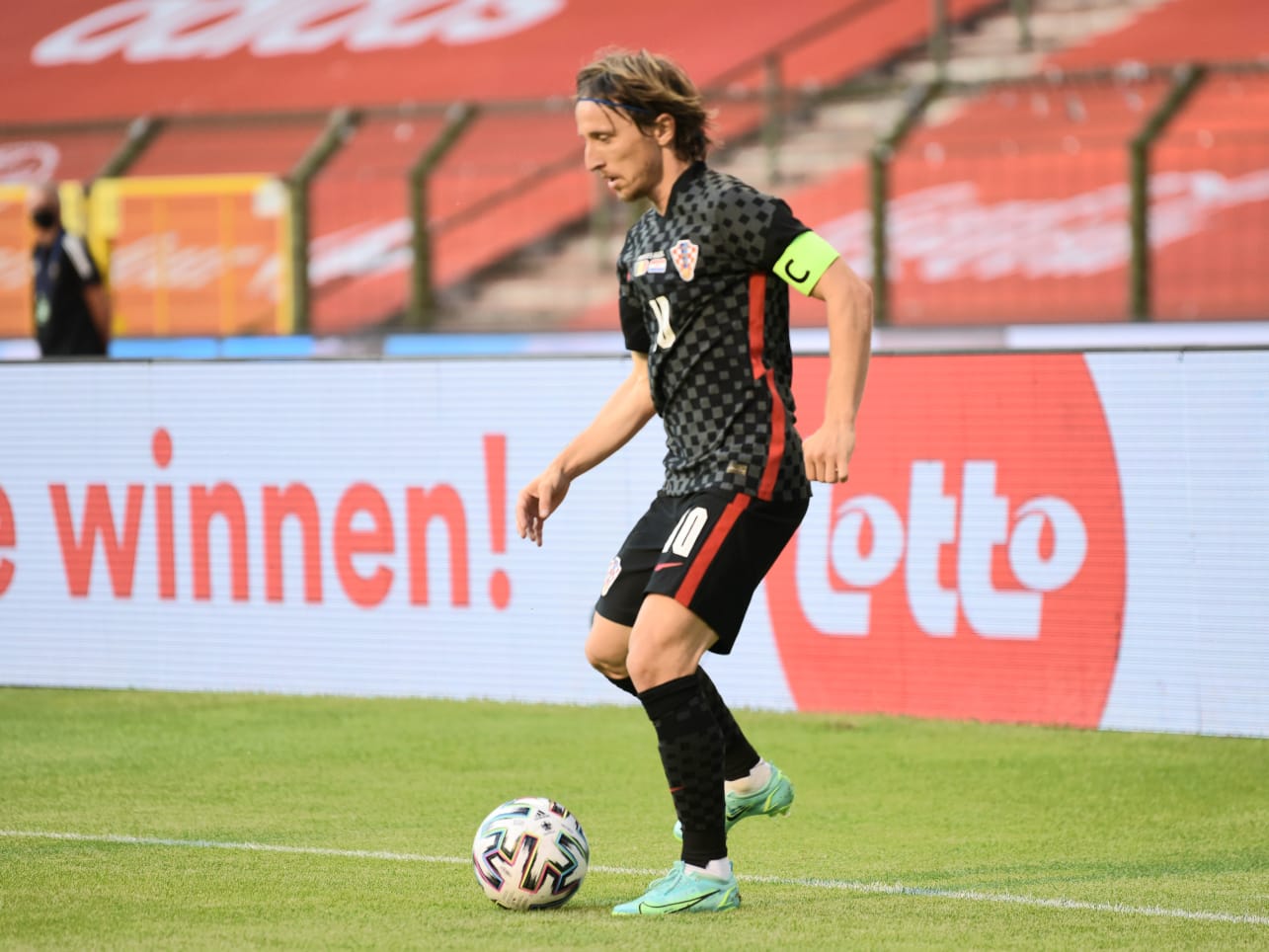
Slobodan Kadic
Belgium finally scored in the 38th minute. A mixup in the Croatia defense allowed Lukaku to score from close range for 1:0. Petković found Perišić for a chance in the 42nd minute but he was offside.
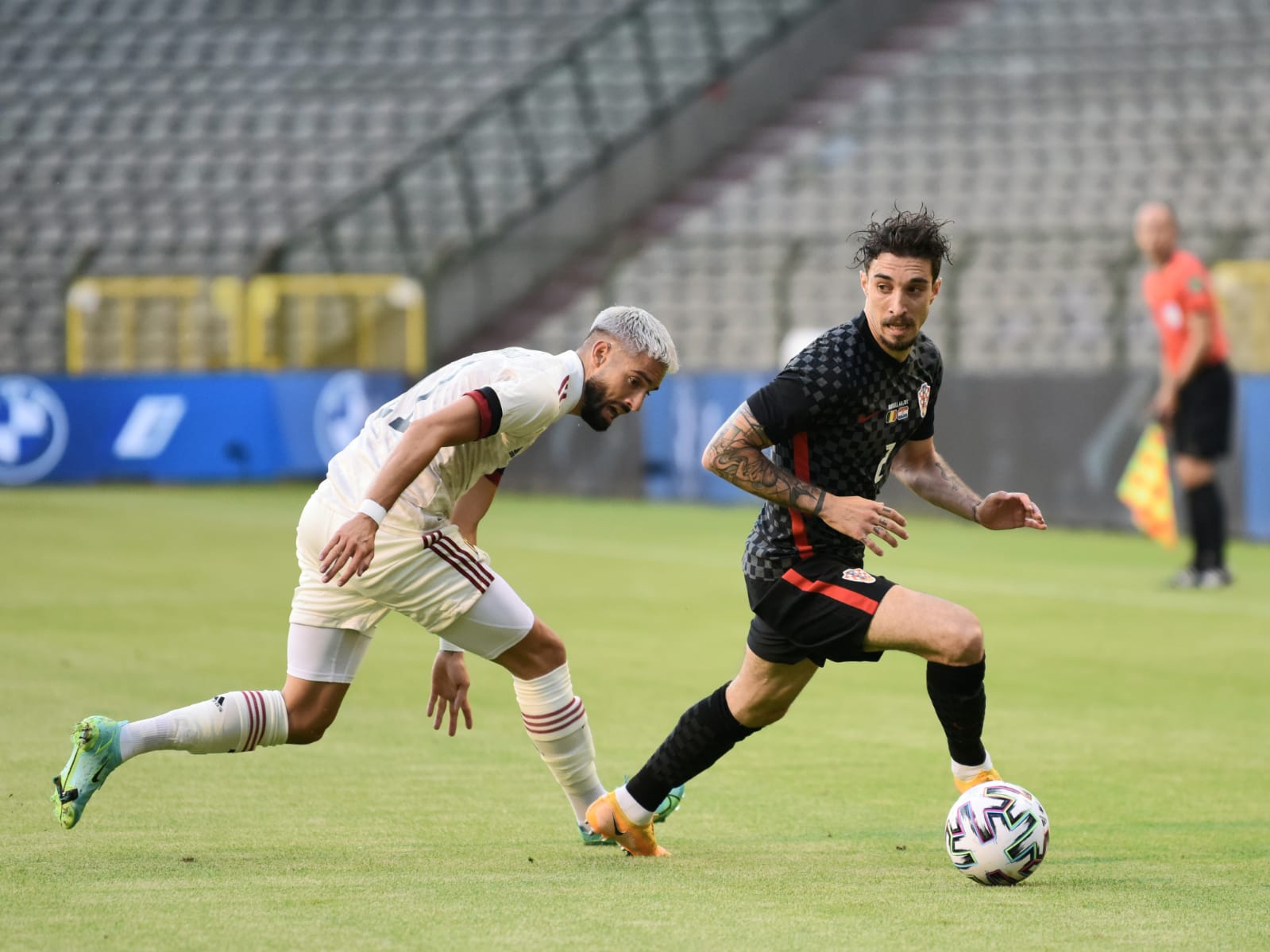
Slobodan Kadic
Gvardiol made his debut at left back instead of Barišić to start the second half and quickly confirmed his spot on the Croatia team. A great ball in the box by Gvardiol in the 52nd minute found the head of Petković who aimed at Courtois.
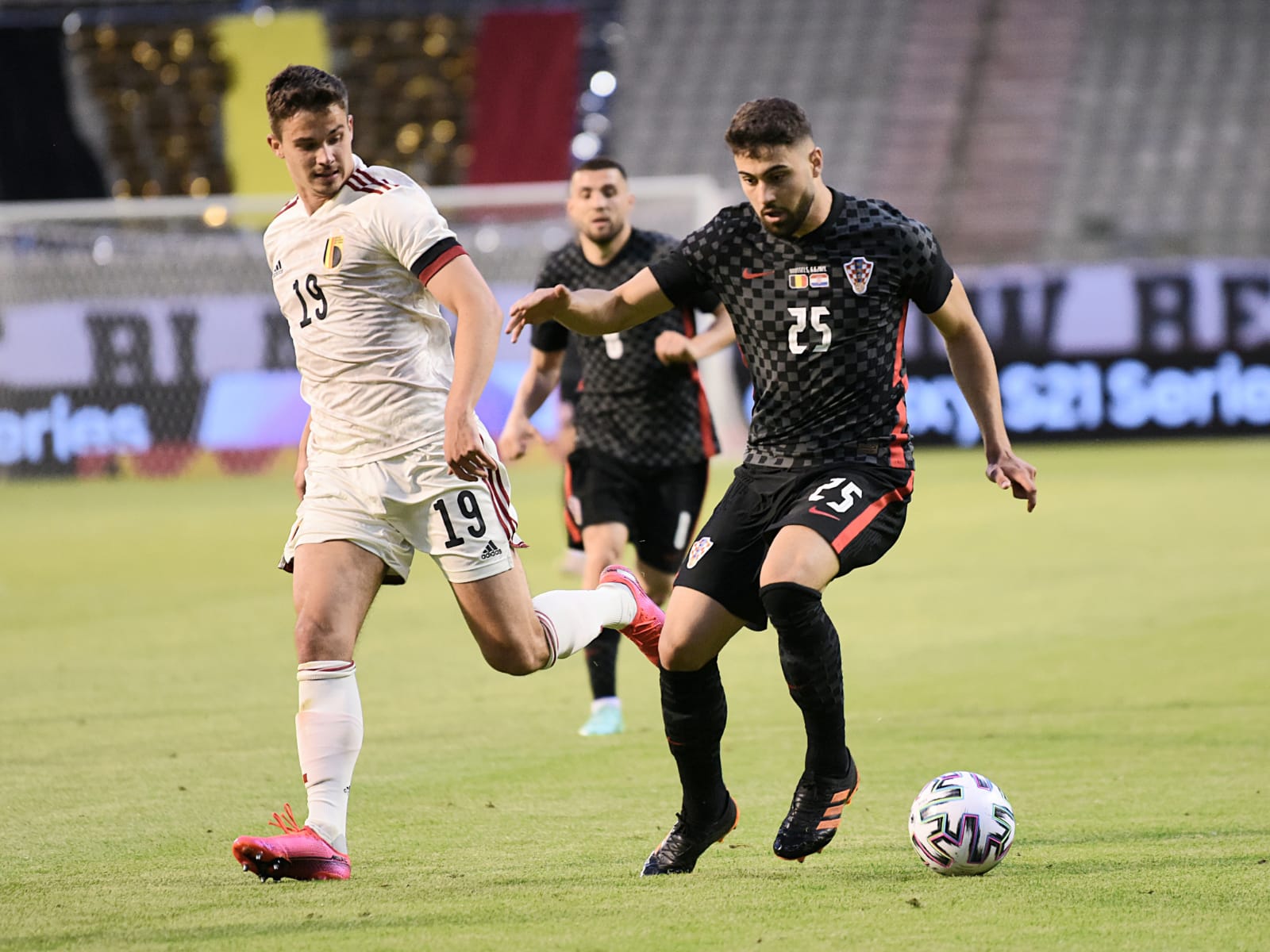
Slobodan Kadic
Mertens had a dangerous opportunity for Belgium moments later was weak in is shot.
Croatia looked good at the opening of the second half but still did not create opportunities. In the 61st minute, Dalić subbed on Pašalić, Vlašić and Kramarić for Modrić, Kovačić and Rebić.
Croatia possessed well in the 10 minutes that followed. Brekalo came on for Petković in the 69th minute. Vlašić shot for Croatia after what felt like ages, but it was an easy save for Courtois.
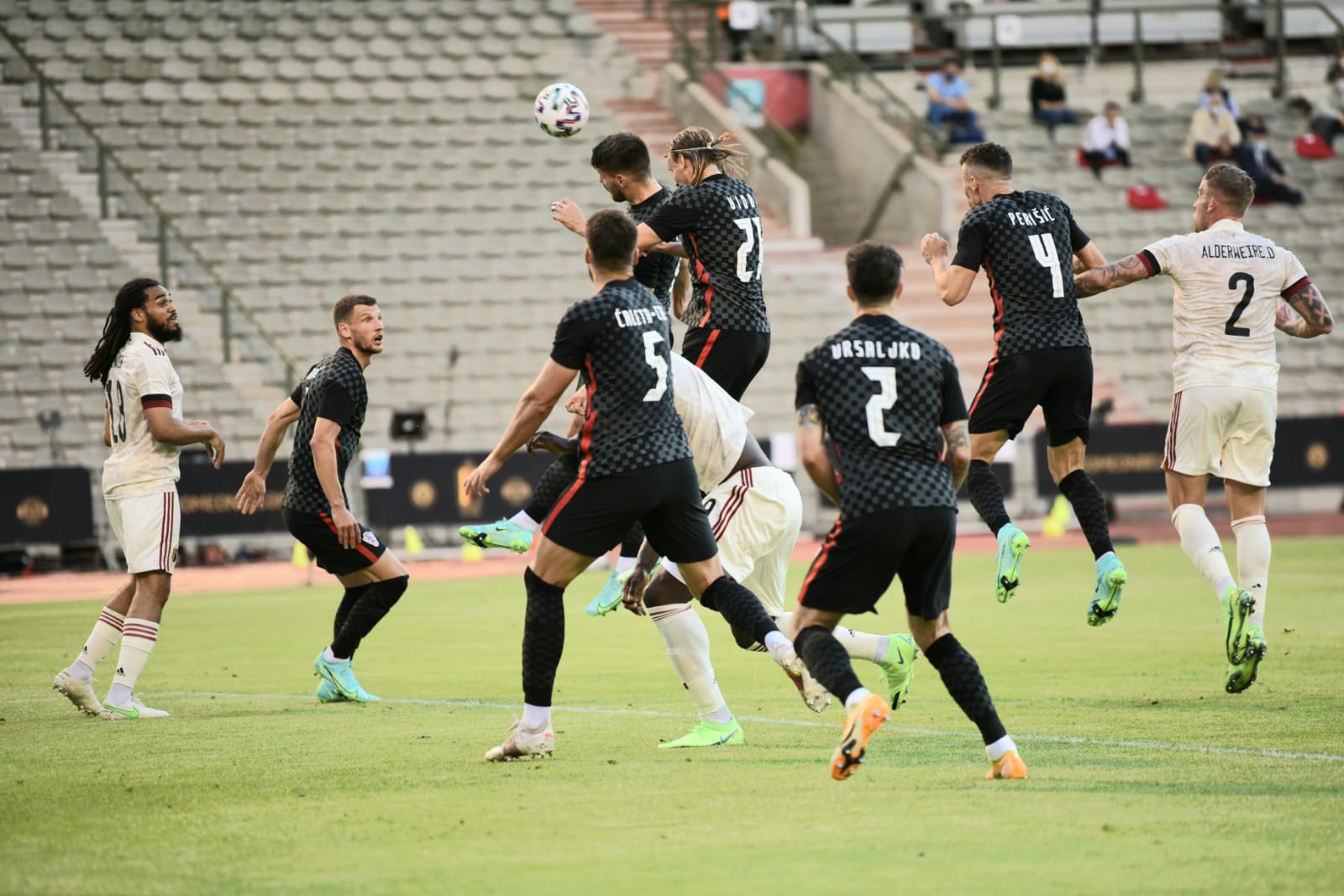
Slobodan Kadic
Oršić came on for Perišić in the 80th minute, and Eden Hazard entered the match for Belgium one minute later.
Belgium had a massive chance in the 88th minute but two brilliant saves by Livakovć kept it 1:0. Brekalo had Croatia's best chance of the game in the 90th minute which was famously saved by Courtois. The match ended 1:0 for Belgium.
To follow the latest sports news in Croatia, follow TCN's dedicated page.
To learn more about sport in Croatia, CLICK HERE.
Ryanair's first flight to Zagreb, tickets from €20
ZAGREB, 3 June 2021 - Irish Ryanair on Wednesday started operating a new route between Zagreb and Brussels Charleroi, which is scheduled twice a week, and the same airline announced the launch of several other flights from Zagreb, with ticket prices from €19.99, Zagreb Airport (MZLZ) has said.
The flight to Milan Bergamo launches on 17 June, and the flights to Gothenburg, London Stansted, and Rome Ciampino will be available from 23 July, when the first Ryanair airplane will be based in Zagreb.
The full Ryanair flight schedule from Zagreb for summer 2021 will be available from September, when the second airplane will be based in Zagreb and nine new routes will open to Germany, France, Norway, Sweden, and Montenegro.
Ryanair's Sales and Marketing Manager for Central and Eastern Europe and the Balkans, Olga Pawlonka, said that she was pleased that her company had officially marked the first flight for Zagreb on the Brussels Charleroi route.
Follow the latest on flights to Croatia HERE and the latest travel updates and COVID-19 news from Croatia HERE.
For more on travel in Croatia, follow TCN's dedicated page.
Friends of Croatia: European Parliament Office in Zagreb - First Contact with Croatian Citizens
May 6, 2021 - The third article in the series "Friends of Croatia: European Parliament Office in Zagreb", explores a small but dedicated office whose central focus is the 12 Croatian members of the European Parliament, as well as informing citizens and educating them about the European Union.
July 1, 2013, was a historic date for Croatian international integration as the country finally joined the European Union. The Union of developed European countries called for an enormous celebration on the main Ban Jelačić square in Zagreb. Many people saw different opportunities, and lots of opportunities were promoted by politicians ahead of joining. But, with almost eight years in the EU, could we actually list specific benefits and determine if Croatia is truly taking part in the „European dream“?
„EU membership made Croatia stronger, and there are many examples of the practical effects of it. I’ll mention two important ones: access to the common market and commitment and implementation of numerous political and economic reforms. Of course, one of the most visible immediate results of the EU membership was the end of customs controls at internal EU borders, which made crossings much smoother, with less hassle for people and goods. The removal of administrative and tariff barriers meant lower costs for businesses which – in combination with access to significant EU funds - translated into concrete economic advantages, helped the recovery, and increased exports. Also worth mentioning - the interest rates on loans have dropped, which lowered the costs of borrowing money for citizens and the business community, and this will be become even more pronounced once the country joins the euro. When it comes to Croatia’s contribution to the EU, along with its heritage, culture, and tradition that enriched the bloc, the country also brought its example and enthusiasm for the EU enlargement to the Western Balkans. Croatia is a vocal advocate of the European perspective for the region and considers the enlargement to be the most effective transformation mechanism that the EU has“, summarized Violeta Simeonova Staničić, the Head of the European Parliament Office in Zagreb, which is dedicated as the first contact between the European Parliament (EP) and citizens in Croatia.
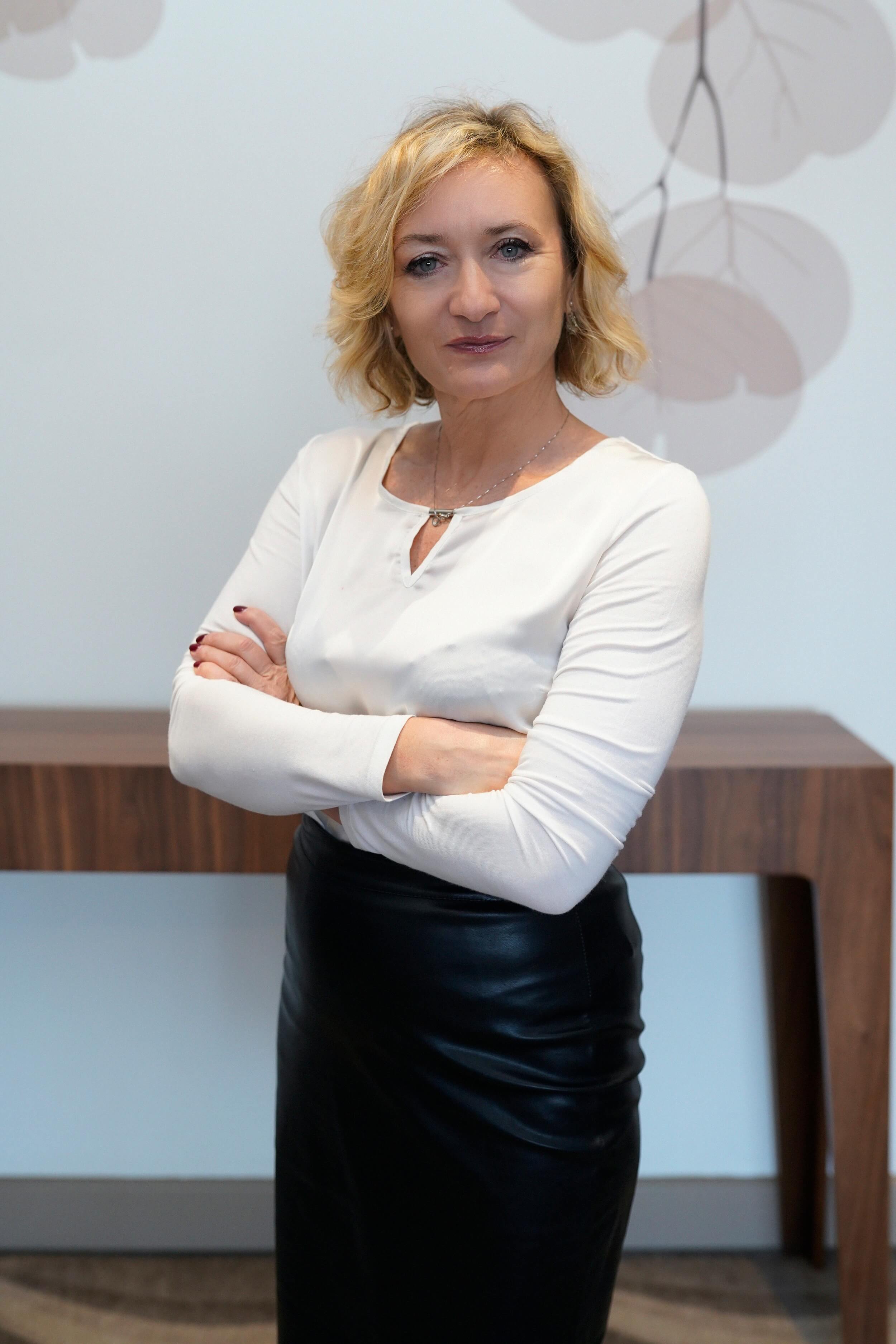
Violeta Simeonova Staničić © European Parliament Office in Zagreb
The Office started its work in February 2013. Simeonova Staničić and three other associates put the whole project in a small space in the backyard of a former EU delegation. Describing the team in 2013 as the „EP Delta Force“, Simeonova Staničić recalled the difficulties of their early engagement. „It was difficult to operate properly and to be visible as the country was not yet a member state, so we were not able to function as an official liaison office. We couldn't even do a proper information campaign for the first EU elections when Croats decided who would be their first official members of the European Parliament“, she said.
While any EU organization is often perceived as big and loaded with people, the EP office in Zagreb counts six staff members. Being a complex organization which can often be misunderstood, their informative service on all thing EU is extremely important.
„People tend to have a lot of misconceptions when it comes to the competencies of the EU. In various policy areas, EU member states still hold primary responsibility. Health policy, for example. Social policies and retirement as well. In others, the EU is in the lead as it is ultimately more beneficial for all countries involved that decisions are made and actions taken with the interests of the entire Union in mind. Unfortunately, too often, we can see that when something good happens, usually national governments are credited for it, and if something is not going well, then Brussels naturally is to blame. But various crises and challenges have shown that the EU is at its finest when working as a team player, one community and a common market“, explained Simeonova Staničić. She added that when solidarity prevails, everyone gains a sentence that can underline the usefulness of international cooperation that is the EU.
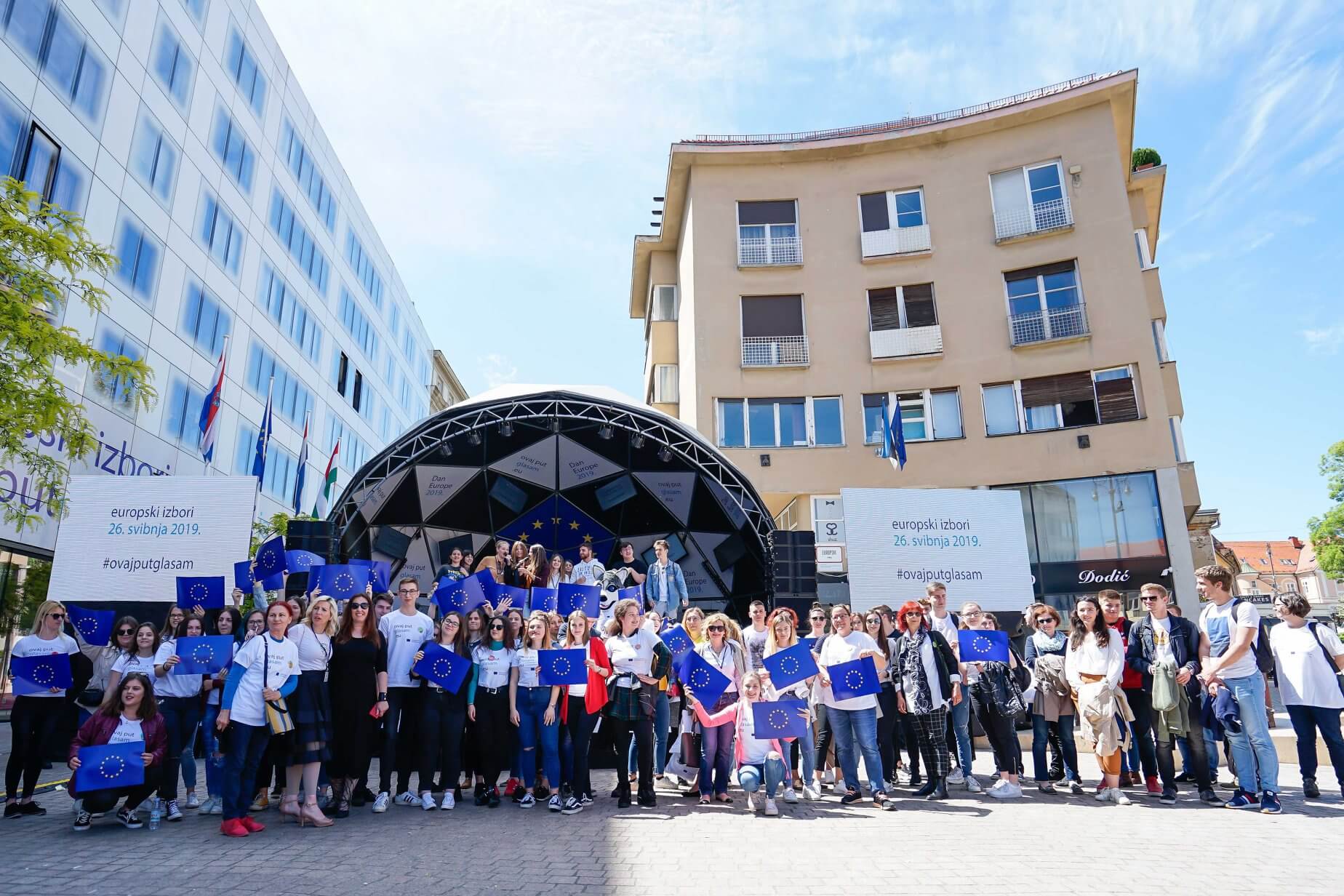
2019 EP elections campaign "This time I vote" © European Parliament Office in Zagreb
The citizens recognize the help the Zagreb EP office can offer, and the Office gets lots of inquiries daily. Over time, the phone calls were more often replaced by e-mails, and first contacts are often made through the Office's social networks. 45,000 followers on Facebook and heavy engagements on Twitter and Instagram, and the quick response of the small staff are certainly admirable.
„We sometimes receive the bulk of documents as many people send us copies of their dealings with various institutions or judicial bodies. These types of problems are, of course, beyond our remit, but we will always try to help people to identify the right authority they need to address and contact in order to resolve their issues. We also get requests from various researchers and scholars who need help with finding certain data and material important for their work, or who need background information on a certain topic“, said Simeonova Staničić, adding the questions they receive are quite diverse.
The central part of the Office’s daily work revolves around 12 Croatian members of the Parliament. “Working with Croatian members of European Parliament is our daily priority and what we center our work around. We organise press conferences and events around issues they work on and committees that they are members of. We cooperate and communicate with them very successfully, as we foster a mutually beneficial relationship with them. As a rule of a thumb, we virtually have no event without a member of European Parliament present“, Simeonova Staničić explains.
The other part of the Office's role includes working with youth, media, and NGOs.
When it comes to the media, the Office informs daily about ongoing debates and discussions concerning the day-to-day activities of the European Parliament. They also strive to put important decisions in context and promote and explain the work of members of the Parliament. Before the coronavirus pandemic, the Office even invited journalists to follow the plenary sessions in Strasbourg to give them the opportunity to familiarise themselves better with the institution and its role in the EU decision-making process. In return, a steady community of journalists following EU affairs is formed in Croatia, and the expansion of reporters is something the Office always welcomes. The accent is put on working with local media, and several outlets managed to get co-finance for their projects by European grants.
Cooperation with NGOs depends on every project and topic of interest, but with the diversity of NGOs, some sort of collaboration with some organisation is always ongoing.
Regarding the youth, two projects stand out. „Our two most successful projects to date are Euroscola and European Parliament Ambassador School Programme (EPAS). Euroscola became so popular among all Croatian schools that whenever we had rounds of regional or national selections, we had over 100 schools competing for very limited quota to go to Strasbourg for a day at the European Parliament. Through Euroscola, we created a fantastic network of incredibly involved, active, hard-working schools all over Croatia. The EPAS program was launched in 2016, and today we have a wide network of over 50 high schools scattered across the country. They cooperate closely with us and follow the work of Croatian MEPs throughout the entire school year“, pointed out Simeonova Staničić.
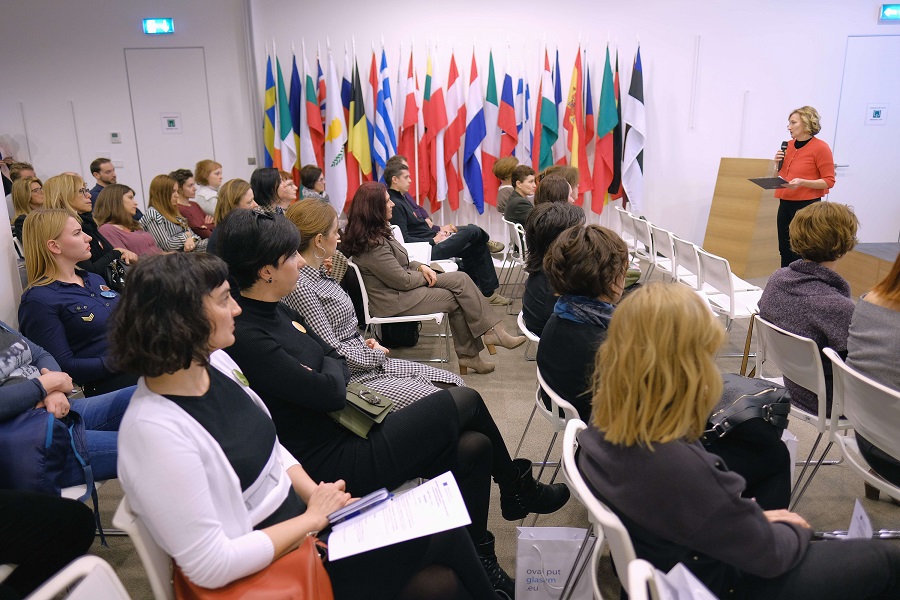
Senior EP Ambassadors © European Parliament Office in Zagreb
Apart from media and citizens, the cooperation with the official bodies of the state is at a high level too.
„We collaborate very well with the Ministry of Foreign Affairs and other government institutions. For example, we cooperate when the delegation of the European Parliament comes to Croatia to work on a certain topic related to the upcoming legislation. This cooperation was particularly pronounced in the run-up to and during the first Croatian presidency of the Council of the European Union“, said Simeonova Staničić.
Particularly good collaboration is also made with the Croatian Parliament, a natural counterpart of the European Parliament. Currently, they are organizing the conference on the future of Europe, but also a more regular public award ceremony for the European Citizens’ Prize (established in 2008 by the EP to award individuals or groups that contributed to empowering European Integration).
„We are also regularly in contact with foreign embassies in Croatia, in pre-Covid times they were not only guests at our events, but also provided interesting speakers from their own countries for our panels and conferences “, described Simeonova Staničić the vast web of cooperation the Office has in Croatia.
Although being an Office for the European Parliament, they also help citizens by giving information on other EU institutions and how to get in touch with them. Informing citizens of ways to actively take part in European democracy, Simeonova Staničić describes as „the core of everything we do as an office of the most democratic institution of the EU“.
„European citizens can petition the European Parliament through our dedicated portal (European's Citizens's Initiative). This is a very transparent process whereby individuals or associations can submit a petition on a subject which comes within the European Union’s fields of activity and which affects them directly “, she explained.
Croatian perception and EU scepticism.
Perhaps it depends on the algorithm or just the loudness of its spokespersons, but it seems Euroscepticism is on the rise in Croatia. Still, Simeonova Staničić's view is much more optimistic and based on the public opinion surveys.
„Actually, the latest Eurobarometer survey shows that 78% of participants in Croatia state that EU membership is beneficial to Croatia, and 74% of those asked believe that COVID-19 economic recovery will be faster thanks to the EU. The majority of the respondents also answered that they have a positive image of the EU“, she said. She continued, however, that almost similar in size is the number of people who have neither negative nor positive opinions.
„For us, these 'non-committal' ones are really important and we try to reach them with our work. We need to raise their awareness about the advantages of the EU; thus, we mainly address young people, who are natural citizens of the EU, who are so accustomed to all the freedoms and opportunities the EU gave them that they take them for granted. They are not aware that there was a time, not so long ago, when these opportunities did not exist“, explained the Head of Office headmistress.
She added that entrepreneurs, managers, and small and medium business owners are most aware of EU benefits, making them natural partners and ambassadors with whom the Office also works really well.
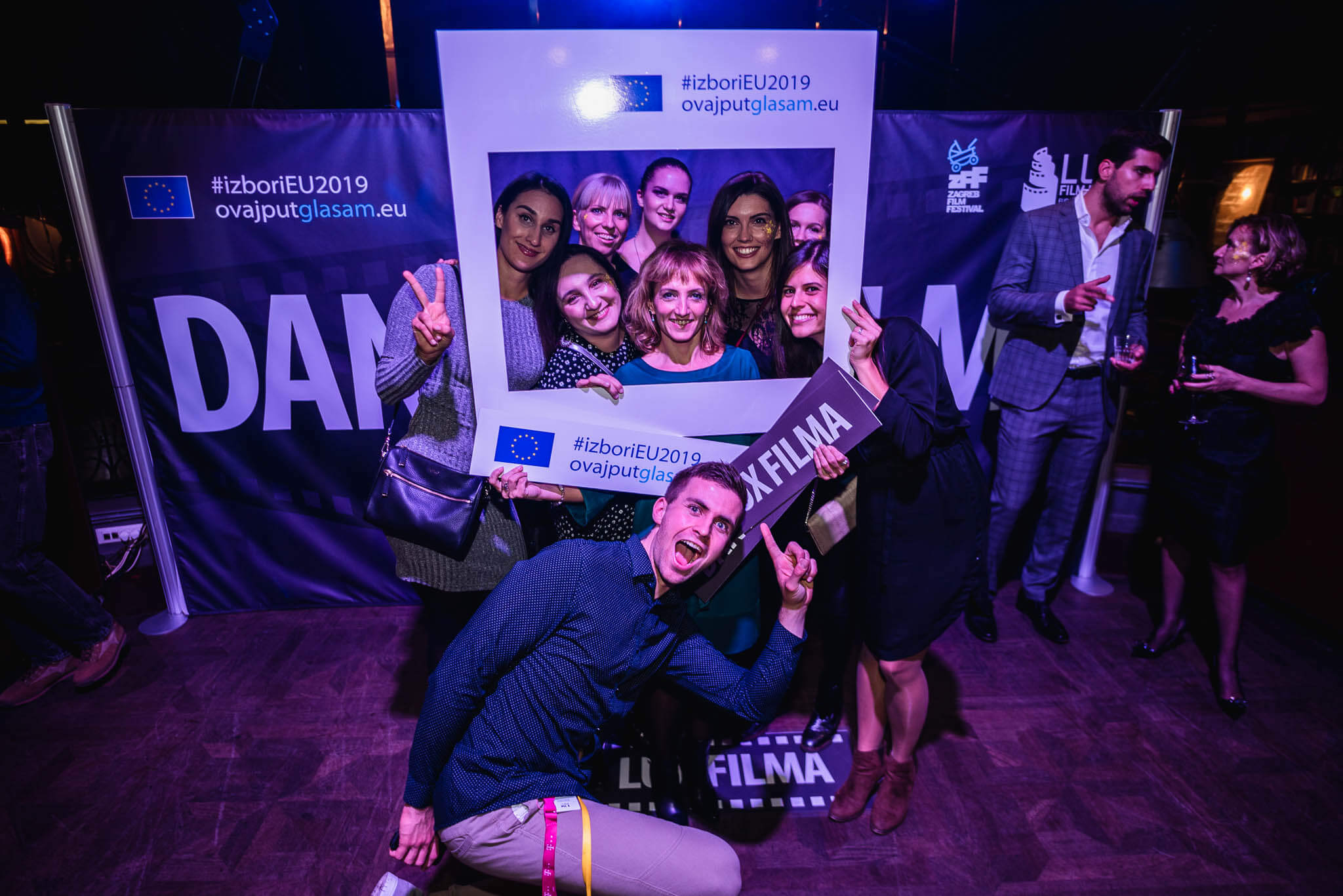
Lux Party on election year © European Parliament Office in Zagreb
In similar rhetoric, Simenonova Staničić dismissed my thesis that young people recognize the easier traveling and working in other member countries as the only benefits of the EU. Firstly pointing out that „freedom of movement, freedom of choice, and the privilege to be employed without administrative barriers in any member state is one of the biggest values and benefits coming from an EU membership“, which means „escaping Croatia is not the right terminology“. Also, just as Croatians are leaving the country, other countries experience the same thing as their citizens are coming to Croatia.
„Due to the pandemic, we are actually witnessing more EU nationals temporarily moving to Croatia, as they work remotely. There is a large community of EU nationals which continues to grow, and it has a lot to thank Croatia’s EU membership“, argued Simeona Staničić.
Indeed, the reputation, and trust in the global community secured by EU membership, certainly contributed to the rise of digital nomads coming to Croatia, on which TCN regularly reports.
The Head of Office once again repeated how most of the benefits in EU Croatians regularly experience and are enjoyed without realizing it is thanks to the EU.
„When there is a new school lab or student housing being built with European funds, or when our young people go off to university or college and take for granted that they would go on an Erasmus exchange; when they don’t have to pay major tuition fees while studying abroad in some other EU member state but are charged the same rate as locals; when, together with other European countries like France, Belgium, and Germany, your government is part of negotiations on major questions of international importance: from health to peace and security...“, she listed various examples.
When asked to comment on Croatia's respect for human rights and European values, a question inspired by last year's cases the Republic of Croatia lost in the European Court of Human rights in Strasbourg, Siemonova Staničić refused to comment and instead explained that the role of the Office in Zagreb (as well as anywhere in Europe for that matter) is not political.
„We are here to provide support to members of the European Parliament in the exercise of their official mandate on the hand and to ensure that people understand actions of the Parliament and to encourage them to engage in the European democratic process on the other. This is important because citizens have tools to influence the legislative agenda of the EU directly “, explained Simeonova Staničić. For the already mentioned European Citizens Initiative, the EP must consider proposals with 1 million verified signatures.
Zagreb office for every EU citizen: Speaking English, Croatian, and six more languages!
As the EU is dedicated to being beneficial for every EU citizen from every country in the organization, so is the EP Office in Zagreb. Simeonova Staničić says the Office serves every EU citizen in Croatia, and whether - in person or online, they will address any issue or interest non-Croatian EU citizens may have and gladly respond and engage.
„In general, we work in the language of our host, which in this case is Croatian. Nevertheless, every European official is obliged to pass the employment exams in one of the working languages of the European Union and within two years to be able to work in 3 languages. In our case, our Office uses predominantly Croatian and English, but I am proud to say that my colleagues are proficient in many languages, and we can serve European citizens also in French, German, Slovenian, Bulgarian, Dutch, and Italian, without hesitation“, assured Simeonova Staničić.
The same service is also offered to Croatians in other EU countries, as every member state has an EP office. And cooperation being the keyword, the offices are frequently in touch as well.
"For example, the Parliament organized an online solidarity event called #EPASwithPetrinja where pupils from three member states (France, Ireland, and Spain) engaged with their counterparts from Petrinja and Zagreb to express solidarity in the wake of the disastrous earthquake that hit parts of Croatia and to comfort children their age from those hard-hit areas. At the event, we had members of the European Parliament from France, Ireland, and Croatia as speakers,“ Simeonova Staničić gave one example, adding that the cooperation is also there whenever there is a common topic or members of the European Parliament from different delegations work on major legislative or policy issues of interest to European citizens across the Union.

EPAS with Petrinja © European Parliament Office in Zagreb
The EP offices are always located in the capital city, and several countries also have the so-called „Antenna offices“ located in other larger cities such as Germany (Munich), France (Marseille), Poland (Wroclaw), Spain (Barcelona), and Italy (Milan).
„We do not have offices around the country. However, both our Office and the Representation of the European Commission in Croatia use the network of the so-called Europe Direct Information Centres. There are 10 of them in Croatia currently, and they are located in Petrinja, Slavonski Brod, Čakovec, Šibenik, Zadar, Osijek, Virovitica, Split, Pula, and Karlovac. They are not under our authority - we do not control them, and they are not a part of our structure. But they are our natural partners in various activities and often serve as local contact points“, explained Simeonova Staničić.
To conclude, the European Parliament Office in Zagreb is open to assist anyone that wants to receive any information related to the European Parliament - be it regarding its debates, ongoing plenaries, committee meetings, work of the members of the European Parliament, or general information concerning other European institutions.
The address of the Office is Augusta Cesarca 4 in the House of Europe on European Square in Zagreb, which is open from 9 am to 5 pm (however, due to the pandemic, the office is closed to the public until further notice). At that same time, you can reach them on the general E-mail This email address is being protected from spambots. You need JavaScript enabled to view it. or on the following phone numbers:
For public relations (citizen inquires):
Violeta Simeonova Staničić (Office head): + 385 1 4880 280 (E-mail: This email address is being protected from spambots. You need JavaScript enabled to view it.)
Janja Mateja Aleš (assistant): +385 1 4880 269 (This email address is being protected from spambots. You need JavaScript enabled to view it.)
Andrea Čović Vidović: +385 1 4880 273 or +385 91 510 6830 (E-mail: This email address is being protected from spambots. You need JavaScript enabled to view it.)
Marko Boko: +385 1 4880 274 (E-mail: This email address is being protected from spambots. You need JavaScript enabled to view it.)
For media relations:
Maja Ljubić Kutnjak: +385 1 4880 272 or + 385 99 490 4715 (This email address is being protected from spambots. You need JavaScript enabled to view it.)
Barbara Peranić: +385 1 4880 272 or + 385 99 271 3026 (This email address is being protected from spambots. You need JavaScript enabled to view it.)
You can also follow the Office on Facebook, Twitter, Instagram, Youtube, and Flickr.
For any changes with the address, contacts, etc., check their official website.
To read more from the series "Friends of Croatia", follow TCN's dedicated page.
For more about European Union in Croatia, follow TCN's dedicated page
No Restrictions on Aid to Enterprises, Says Daily Paper Jutarnji List
ZAGREB, 5 March, 2021 - Brussels will leave it to Zagreb to decide on how to distribute money from the EU Recovery Fund, the Friday issue of the Jutarnji List daily reports, noting that there are no restrictions on aid to enterprises.
There are no strict limits in drafting the national recovery and resilience plan, through which around HRK 45 billion of EU funds will be made available to Croatia to help it recover from the crisis caused by the coronavirus pandemic, in terms of how much funds can be allocated for public investments and how much for private investments, as there is no such distinction in EU regulations.
This conclusion is based on a reply from the European Commission, after the Croatian Employers' Association asked that at least 50% of the available money be disbursed in direct grants for investments by the private sector, instead of spending most of the HRK 45 billion on investments in the public sector.
According to an interpretation presented earlier by Croatian negotiators and published by Jutarnji List, entrepreneurs would have access, through the National Recovery and Resilience Plan, to direct grants and loan subsidies and guarantees in the maximum amount of HRK 4.5 billion, or only 10% of the available amount. In citing the amount, Croatian negotiators referred to restrictions imposed by the EC.
Zvonimir Savić, PM Andrej Plenković's advisor and national coordinator for the National Recovery and Resilience Plan, has nonetheless said that around 30% of the HRK 45 billion could end up in the private sector, if one takes into account the involvement of businesses in planned public projects, from research and development, energy transition and development of innovative tourism to stronger food supply chains, the daily says.


